

Top 100 Latest Research Topics in Molecular Biology 2024 [Updated]
Table of Contents
Introduction
Molecular Biology is a branch of biology that deals with the composition, structure, and communications of cellular molecules like proteins and nucleic acids responsible for various biological procedures for maintaining and functioning cells. It mainly involves multiple biomolecules such as amino acids, lipids, proteins, nucleic acids, and carbohydrates, along with their structure, compositions, and interactions in the life processes. A molecular biologist is responsible for doing experiments to investigate structures, functions, processing, and regulation of biological molecules and their interactions. A molecular biologist also tries to understand a molecule’s structure, which includes details like shape and the location of the active sites on a protein, impacting the function of a molecule. Such information offers basic knowledge on how biology functions and assists in informing the efforts of various scientists looking to manipulate that biology. Such scientists involve drug designers and also genetic engineers.
Now-a-days a lot of research is going on in molecular biology and people are in search of novel areas in molecular biology for conducting research with a sole purpose of finding some new techniques or new things that can be used for human or animal welfare. Students of graduation, post-graduation and PhD levels are working on several topics for their research work. Let’s have a look on some of the trending topics in molecular biology for doing research.

How molecular biology affects life science?
Molecular biology has a significant effect on investigations in life science. Some major molecular biology advancements encouraged research and progressions in every life science discipline. Some of the advancements are
- Development of various experimental methods in molecular biology with wide applications
- The increasing flow of data on various technical novelties and scientific discoveries all over the scientific community
- Development of specified software and consistently updated database for analysis and storage of data on the genotypes.
- All this has resulted in revolutionizing discoveries in various sectors of molecular biology. One of the best examples is the invention of high throughput biology, high-level sequencing, and Recombinant DNA technology that assisted in unveiling the high complicacies of the genome and explicating the precise methods for transmitting genetic information.
With this rapidly changing and consistently evolving nature of the molecular biology sector, it can be easily anticipated that the innovatory effect of Molecular biology in life science is just beginning and is far from being finished.
We also provide Labmonk notes on some subjects on our platform. Click here to check out . If you are interested to share your notes on this platform please contact us.
Let’s have a look at some of the trending topics in molecular biology for doing research. Click the next page .
3 thoughts on “Top 100 Latest Research Topics in Molecular Biology 2024 [Updated]”
I was suggested this website by my cousin. I’m not sure whether this post is written by him as no one else know such detailed about my difficulty. You are wonderful! Thanks!|
- Pingback: topics in molecular biology - infoai
Leave a Comment Cancel reply
Save my name, email, and website in this browser for the next time I comment.
- How it works
Published by Robert Bruce at August 29th, 2023 , Revised On September 5, 2023
Biology Research Topics
Are you in need of captivating and achievable research topics within the field of biology? Your quest for the best biology topics ends right here as this article furnishes you with 100 distinctive and original concepts for biology research, laying the groundwork for your research endeavor.
Table of Contents
Our proficient researchers have thoughtfully curated these biology research themes, considering the substantial body of literature accessible and the prevailing gaps in research.
Should none of these topics elicit enthusiasm, our specialists are equally capable of proposing tailor-made research ideas in biology, finely tuned to cater to your requirements.
Thus, without further delay, we present our compilation of biology research topics crafted to accommodate students and researchers.
Research Topics in Marine Biology
- Impact of climate change on coral reef ecosystems.
- Biodiversity and adaptation of deep-sea organisms.
- Effects of pollution on marine life and ecosystems.
- Role of marine protected areas in conserving biodiversity.
- Microplastics in marine environments: sources, impacts, and mitigation.
Biological Anthropology Research Topics
- Evolutionary implications of early human migration patterns.
- Genetic and environmental factors influencing human height variation.
- Cultural evolution and its impact on human societies.
- Paleoanthropological insights into human dietary adaptations.
- Genetic diversity and population history of indigenous communities.
Biological Psychology Research Topics
- Neurobiological basis of addiction and its treatment.
- Impact of stress on brain structure and function.
- Genetic and environmental influences on mental health disorders.
- Neural mechanisms underlying emotions and emotional regulation.
- Role of the gut-brain axis in psychological well-being.
Cancer Biology Research Topics
- Targeted therapies in precision cancer medicine.
- Tumor microenvironment and its influence on cancer progression.
- Epigenetic modifications in cancer development and therapy.
- Immune checkpoint inhibitors and their role in cancer immunotherapy.
- Early detection and diagnosis strategies for various types of cancer.
Also read: Cancer research topics
Cell Biology Research Topics
- Mechanisms of autophagy and its implications in health and disease.
- Intracellular transport and organelle dynamics in cell function.
- Role of cell signaling pathways in cellular response to external stimuli.
- Cell cycle regulation and its relevance to cancer development.
- Cellular mechanisms of apoptosis and programmed cell death.
Developmental Biology Research Topics
- Genetic and molecular basis of limb development in vertebrates.
- Evolution of embryonic development and its impact on morphological diversity.
- Stem cell therapy and regenerative medicine approaches.
- Mechanisms of organogenesis and tissue regeneration in animals.
- Role of non-coding RNAs in developmental processes.
Also read: Education research topics
Human Biology Research Topics
- Genetic factors influencing susceptibility to infectious diseases.
- Human microbiome and its impact on health and disease.
- Genetic basis of rare and common human diseases.
- Genetic and environmental factors contributing to aging.
- Impact of lifestyle and diet on human health and longevity.
Molecular Biology Research Topics
- CRISPR-Cas gene editing technology and its applications.
- Non-coding RNAs as regulators of gene expression.
- Role of epigenetics in gene regulation and disease.
- Mechanisms of DNA repair and genome stability.
- Molecular basis of cellular metabolism and energy production.
Research Topics in Biology for Undergraduates
- 41. Investigating the effects of pollutants on local plant species.
- Microbial diversity and ecosystem functioning in a specific habitat.
- Understanding the genetics of antibiotic resistance in bacteria.
- Impact of urbanization on bird populations and biodiversity.
- Investigating the role of pheromones in insect communication.
Synthetic Biology Research Topics
- Design and construction of synthetic biological circuits.
- Synthetic biology applications in biofuel production.
- Ethical considerations in synthetic biology research and applications.
- Synthetic biology approaches to engineering novel enzymes.
- Creating synthetic organisms with modified functions and capabilities.
Animal Biology Research Topics
- Evolution of mating behaviors in animal species.
- Genetic basis of color variation in butterfly wings.
- Impact of habitat fragmentation on amphibian populations.
- Behavior and communication in social insect colonies.
- Adaptations of marine mammals to aquatic environments.
Also read: Nursing research topics
Best Biology Research Topics
- Unraveling the mysteries of circadian rhythms in organisms.
- Investigating the ecological significance of cryptic coloration.
- Evolution of venomous animals and their prey.
- The role of endosymbiosis in the evolution of eukaryotic cells.
- Exploring the potential of extremophiles in biotechnology.
Biological Psychology Research Paper Topics
- Neurobiological mechanisms underlying memory formation.
- Impact of sleep disorders on cognitive function and mental health.
- Biological basis of personality traits and behavior.
- Neural correlates of emotions and emotional disorders.
- Role of neuroplasticity in brain recovery after injury.
Biological Science Research Topics:
- Role of gut microbiota in immune system development.
- Molecular mechanisms of gene regulation during development.
- Impact of climate change on insect population dynamics.
- Genetic basis of neurodegenerative diseases like Alzheimer’s.
- Evolutionary relationships among vertebrate species based on DNA analysis.
Biology Education Research Topics
- Effectiveness of inquiry-based learning in biology classrooms.
- Assessing the impact of virtual labs on student understanding of biology concepts.
- Gender disparities in science education and strategies for closing the gap.
- Role of outdoor education in enhancing students’ ecological awareness.
- Integrating technology in biology education: challenges and opportunities.
Biology-Related Research Topics
- The intersection of ecology and economics in conservation planning.
- Molecular basis of antibiotic resistance in pathogenic bacteria.
- Implications of genetic modification of crops for food security.
- Evolutionary perspectives on cooperation and altruism in animal behavior.
- Environmental impacts of genetically modified organisms (GMOs).
Biology Research Proposal Topics
- Investigating the role of microRNAs in cancer progression.
- Exploring the effects of pollution on aquatic biodiversity.
- Developing a gene therapy approach for a genetic disorder.
- Assessing the potential of natural compounds as anti-inflammatory agents.
- Studying the molecular basis of cellular senescence and aging.
Biology Research Topic Ideas
- Role of pheromones in insect mate selection and behavior.
- Investigating the molecular basis of neurodevelopmental disorders.
- Impact of climate change on plant-pollinator interactions.
- Genetic diversity and conservation of endangered species.
- Evolutionary patterns in mimicry and camouflage in organisms.
Biology Research Topics for Undergraduates
- Effects of different fertilizers on plant growth and soil health.
- Investigating the biodiversity of a local freshwater ecosystem.
- Evolutionary origins of a specific animal adaptation.
- Genetic diversity and disease susceptibility in human populations.
- Role of specific genes in regulating the immune response.
Cell and Molecular Biology Research Topics
- Molecular mechanisms of DNA replication and repair.
- Role of microRNAs in post-transcriptional gene regulation.
- Investigating the cell cycle and its control mechanisms.
- Molecular basis of mitochondrial diseases and therapies.
- Cellular responses to oxidative stress and their implications in ageing.
These topics cover a broad range of subjects within biology, offering plenty of options for research projects. Remember that you can further refine these topics based on your specific interests and research goals.
Frequently Asked Questions
What are some good research topics in biology?
A good research topic in biology will address a specific problem in any of the several areas of biology, such as marine biology, molecular biology, cellular biology, animal biology, or cancer biology.
A topic that enables you to investigate a problem in any area of biology will help you make a meaningful contribution.
How to choose a research topic in biology?
Choosing a research topic in biology is simple.
Follow the steps:
- Generate potential topics.
- Consider your areas of knowledge and personal passions.
- Conduct a thorough review of existing literature.
- Evaluate the practicality and viability.
- Narrow down and refine your research query.
- Remain receptive to new ideas and suggestions.
Who Are We?
For several years, Research Prospect has been offering students around the globe complimentary research topic suggestions. We aim to assist students in choosing a research topic that is both suitable and feasible for their project, leading to the attainment of their desired grades. Explore how our services, including research proposal writing , dissertation outline creation, and comprehensive thesis writing , can contribute to your college’s success.
You May Also Like
To cite a TED Talk in APA style, include speaker’s name, publication year, talk title, “TED Conferences,” and URL for clarity and accuracy.
The central idea of this excerpt revolves around the exploration of key themes, offering insights that illuminate the concepts within the text.
What is a manuscript? A manuscript is a written or typed document, often the original draft of a book or article, before publication, undergoing editing and revisions.
Ready to place an order?
USEFUL LINKS
Learning resources, company details.
- How It Works
Automated page speed optimizations for fast site performance
200+ Unique And Interesting Biology Research Topics For Students In 2023

Are you curious about the fascinating world of biology and its many research possibilities? Well, you are in the right place! In this blog, we will explore biology research topics, exploring what biology is, what constitutes a good research topic, and how to go about selecting the perfect one for your academic journey.
So, what exactly is biology? Biology is the study of living organisms and their interactions with the environment. It includes everything from the tiniest cells to the largest ecosystems, making it a diverse and exciting field of study.
Stay tuned to learn more about biology research topics as we present over 200 intriguing research ideas for students, emphasizing the importance of selecting the right one. In addition, we will also share resources to make your quest for the perfect topic a breeze. Let’s embark on this scientific journey together!
If you are having trouble with any kind of assignment or task, do not worry—we can give you the best microbiology assignment help at a value price. Additionally, you may look at nursing project ideas .
What Is Biology?
Table of Contents
Biology is the study of living things, like animals, plants, and even tiny organisms too small to see. It helps us understand how these living things work and how they interact with each other and their environment. Biologists, or scientists who study biology, explore topics like how animals breathe, how plants grow, and how our bodies function. By learning about biology, we can better care for the Earth and all its living creatures.
What Is A Good Biology Research Topic?
A good biology research topic is a question or problem in the field of biology that scientists want to investigate and learn more about. It should be interesting and important, like studying how a new medicine can treat a disease or how animals adapt to changing environments. The topic should also be specific and clear, so researchers can focus on finding answers. Additionally, it’s helpful if the topic hasn’t been studied extensively before, so the research can contribute new knowledge to the field of biology and help us better understand the natural world.
Tips For Choosing A Biology Research Topics
Here are some tips for choosing a biology research topics:
1. Choose What Interests You
When picking a biology research topic, go for something that you personally find fascinating and enjoyable. When you’re genuinely curious about it, you’ll be more motivated to study and learn.
2. Select a Significant Topic
Look for a subject in biology that has real-world importance. Think about whether your research can address practical issues, like finding cures for diseases or understanding environmental problems. Research that can make a positive impact is usually a good choice.
3. Check If It’s Doable
Consider if you have the necessary tools and time to carry out your research. It’s essential to pick a topic that you can actually study with the resources available to you.
4. Add Your Unique Perspective
Try to find a fresh or different angle for your research. While you can build upon existing knowledge, bringing something new or unique to the table can make your research more exciting and valuable.
5. Seek Guidance
Don’t hesitate to ask for advice from your teachers or experienced researchers. They can provide you with valuable insights and help you make a smart decision when choosing your research topic in biology.
Biology Research Topics For College Students
1. Investigating the role of genetic mutations in cancer development.
2. Analyzing the impact of climate changes on wildlife populations.
3. Studying the ecology of invasive species in urban environments.
4. Investigating the microbiome of the human gut and its relationship to health.
5. Analyzing the genetic diversity of endangered species for conservation.
6. Studying the evolution of antibiotic resistance in bacteria.
7. Investigating the ecological consequences of deforestation.
8. Analyzing the behavior and communication of social insects like ants and bees.
9. Studying the physiology of extreme environments, such as deep-sea hydrothermal vents.
10. Investigating the molecular mechanisms of cell division and mitosis.
Plant Biology Research Topics For College Students
11. Studying the impact of different fertilizers on crop yields and soil health.
12. Analyzing the genetics of plant resistance to pests and diseases.
13. Investigating the role of plant hormones in growth and development.
14. Studying the adaptation of plants to drought conditions.
15. Analyzing the ecological interactions between plants and pollinators.
16. Investigating the use of biotechnology to enhance crop traits.
17. Studying the genetics of plant breeding for improved varieties.
18. Analyzing the physiology of photosynthesis and carbon fixation in plants.
19. Investigating the effects of soil microbiota on plant health.
20. Studying the evolution of plant species in response to changing environments.
Biotechnology Research Topics For College Students
21. Investigating the use of CRISPR-Cas9 technology for genome editing.
22. Analyzing the production of biofuels from microorganisms.
23. Studying the application of biotechnology in medicine, such as gene therapy.
24. Investigating the use of bioplastics as a sustainable alternative to conventional plastics.
25. Analyzing the role of biotechnology in food production, including GMOs.
26. Studying the development of biopharmaceuticals and monoclonal antibodies.
27. Investigating the use of bioremediation to clean up polluted environments.
28. Studying the potential of synthetic biology for creating novel organisms.
29. Analyzing the ethical and social implications of biotechnological advancements.
30. Investigating the use of biotechnology in forensic science, such as DNA analysis.
Molecular Biology Research Topics For Undergraduates
31. Studying the structure and function of DNA and RNA molecules.
32. Analyzing the regulation of gene expression in eukaryotic cells.
33. Investigating the mechanisms of DNA replication and repair.
34. Studying the role of non-coding RNAs in gene regulation.
35. Analyzing the molecular basis of genetic diseases like cystic fibrosis.
36. Investigating the epigenetic modifications that control gene activity.
37. Studying the molecular mechanisms of protein folding and misfolding.
38. Analyzing the molecular pathways involved in cancer progression.
39. Investigating the molecular basis of neurodegenerative diseases.
40. Studying the use of molecular markers in genetic diversity analysis.
Life Science Research Topics For High School Students
41. Investigating the effects of different diets on human health.
42. Analyzing the impact of exercise on cardiovascular fitness.
43. Studying the genetics of inherited traits and diseases.
44. Investigating the ecological interactions in a local ecosystem.
45. Analyzing the diversity of microorganisms in soil or water samples.
46. Studying the anatomy and physiology of a specific organ or system.
47. Investigating the life cycle of a local plant or animal species.
48. Studying the effects of environmental pollutants on aquatic organisms.
49. Analyzing the behavior of a specific animal species in its habitat.
50. Investigating the process of photosynthesis in plants.
Biology Research Topics For Grade 12
51. Investigating the genetic basis of a specific inherited disorder.
52. Analyzing the impact of climate change on a local ecosystem.
53.Studying the biodiversity of a particular rainforest region.
54. Investigating the physiological adaptations of animals to extreme temperatures.
55. Analyzing the effects of pollution on aquatic ecosystems.
56. Studying the life history and conservation status of an endangered species.
57. Investigating the molecular mechanisms of a specific disease.
58. Studying the ecological interactions within a coral reef ecosystem.
59. Analyzing the genetics of plant hybridization and speciation.
60. Investigating the behavior and communication of a particular bird species.
Marine Biology Research Topics
61. Studying the impact of ocean acidification on coral reefs.
62. Analyzing the migration patterns of marine mammals.
63. Investigating the physiology of deep-sea creatures under high pressure.
64. Studying the ecology of phytoplankton and their role in the marine food web.
65. Analyzing the behavior of different species of sharks.
66. Investigating the conservation of sea turtle populations.
67. Studying the biodiversity of deep-sea hydrothermal vent communities.
68. Analyzing the effects of overfishing on marine ecosystems.
69. Investigating the adaptation of marine organisms to extreme cold in polar regions.
70. Studying the bioluminescence and communication in marine organisms.
AP Biology Research Topics
71. Investigating the role of specific enzymes in cellular metabolism.
72. Analyzing the genetic variation within a population.
73. Studying the mechanisms of hormonal regulation in animals.
74. Investigating the principles of Mendelian genetics through trait analysis.
75. Analyzing the ecological succession in a local ecosystem.
76. Studying the physiology of the human circulatory system.
77. Investigating the molecular biology of a specific virus.
78. Studying the principles of natural selection through evolutionary simulations.
79. Analyzing the genetic diversity of a plant species in different habitats.
80. Investigating the effects of different environmental factors on plant growth.
Cell Biology Research Topics
81. Investigating the role of mitochondria in cellular energy production.
82. Analyzing the mechanisms of cell division and mitosis.
83. Studying the function of cell membrane proteins in signal transduction.
84. Investigating the cellular processes involved in apoptosis (cell death).
85. Analyzing the role of endoplasmic reticulum in protein synthesis and folding.
86. Studying the dynamics of the cytoskeleton and cell motility.
87. Investigating the regulation of cell cycle checkpoints.
88. Analyzing the structure and function of cellular organelles.
89. Studying the molecular mechanisms of DNA replication and repair.
90. Investigating the impact of cellular stress on cell health and function.
Human Biology Research Topics
91. Analyzing the genetic basis of inherited diseases in humans.
92. Investigating the physiological responses to exercise and physical activity.
93. Studying the hormonal regulation of the human reproductive system.
94. Analyzing the impact of nutrition on human health and metabolism.
95. Investigating the role of the immune system in disease prevention.
96. Studying the genetics of human evolution and migration.
97. Analyzing the neural mechanisms underlying human cognition and behavior.
98. Investigating the molecular basis of aging and age-related diseases.
99. Studying the impact of environmental toxins on human health.
100. Analyzing the genetics of organ transplantation and tissue compatibility.
Molecular Biology Research Topics
101. Investigating the role of microRNAs in gene regulation.
102. Analyzing the molecular basis of genetic disorders like cystic fibrosis.
103. Studying the epigenetic modifications that control gene expression.
104. Investigating the molecular mechanisms of RNA splicing.
105. Analyzing the role of telomeres in cellular aging.
106. Studying the molecular pathways involved in cancer metastasis.
107. Investigating the molecular basis of neurodegenerative diseases.
108. Studying the molecular interactions in protein-protein networks.
109. Analyzing the molecular mechanisms of DNA damage and repair.
110. Investigating the use of CRISPR-Cas9 for genome editing.
Animal Biology Research Topics
111. Studying the behavior and communication of social insects like ants.
112. Analyzing the physiology of hibernation in mammals.
113. Investigating the ecological interactions in a predator-prey relationship.
114. Studying the adaptations of animals to extreme environments.
115. Analyzing the genetics of inherited traits in animal populations.
116. Investigating the impact of climate change on animal migration patterns.
117. Studying the diversity of marine life in coral reef ecosystems.
118. Analyzing the physiology of flight in birds and bats.
119. Investigating the molecular basis of animal coloration and camouflage.
120. Studying the behavior and conservation of endangered species.
- Neuroscience Research Topics
- Mental Health Research Topics
Plant Biology Research Topics
121. Investigating the role of plant hormones in growth and development.
122. Analyzing the genetics of plant resistance to pests and diseases.
123. Climate change and plant phenology are being examined.
124. Investigating the ecology of mycorrhizal fungi and their symbiosis with plants.
125. Investigating plant photosynthesis and carbon fixing.
126. Molecular analysis of plant stress responses.
127. Investigating the adaptation of plants to drought conditions.
128. Studying the role of plants in phytoremediation of polluted environments.
129. Analyzing the genetics of plant hybridization and speciation.
130. Investigating the molecular basis of plant-microbe interactions.
Environmental Biology Research Topics
131. Analyzing the effects of pollution on aquatic ecosystems.
132. Investigating the biodiversity of a particular ecosystem.
133. Studying the ecological consequences of deforestation.
134. Analyzing the impact of climate change on wildlife populations.
135. Investigating the use of bioremediation to clean up polluted sites.
136. Studying the environmental factors influencing species distribution.
137. Analyzing the effects of habitat fragmentation on wildlife.
138. Investigating the ecology of invasive species in new environments.
139. Studying the conservation of endangered species and habitats.
140. Analyzing the interactions between humans and urban ecosystems.
Chemical Biology Research Topics
141. Investigating the design and synthesis of new drug compounds.
142. Analyzing the molecular mechanisms of enzyme catalysis.
143.Studying the role of small molecules in cellular signaling pathways.
144. Investigating the development of chemical probes for biological research.
145. Studying the chemistry of protein-ligand interactions.
146. Analyzing the use of chemical biology in cancer therapy.
147. Investigating the synthesis of bioactive natural products.
148. Studying the role of chemical compounds in microbial interactions.
149. Analyzing the chemistry of DNA-protein interactions.
150. Investigating the chemical basis of drug resistance in pathogens.
Medical Biology Research Topics
151. Investigating the genetic basis of specific diseases like diabetes.
152. Analyzing the mechanisms of drug resistance in bacteria.
153. Studying the molecular mechanisms of autoimmune diseases.
154. Investigating the development of personalized medicine approaches.
155. Studying the role of inflammation in chronic diseases.
156. Analyzing the genetics of rare diseases and genetic syndromes.
157. Investigating the molecular basis of viral infections and vaccines.
158. Studying the mechanisms of organ transplantation and rejection.
159. Analyzing the molecular diagnostics of cancer.
160. Investigating the biology of stem cells and regenerative medicine.
Evolutionary Biology Research Topics
161. Studying the evolution of human ancestors and early hominids.
162. The genetic variety of species and between species is being looked at.
163. Investigating the role of sexual selection in animal evolution.
164. Studying the co-evolutionary relationships between parasites and hosts.
165. Analyzing the evolutionary adaptations of extremophiles.
166. Investigating the evolution of developmental processes (evo-devo).
167. Studying the biogeography and distribution of species.
168. Analyzing the evolution of mimicry in animals and plants.
169. Investigating the genetics of speciation and hybridization.
170. Studying the evolutionary history of domesticated plants and animals.
Cellular Biology Research Topics
171. Investigating the role of autophagy in cellular homeostasis.
172. Analyzing the mechanisms of cellular transport and trafficking.
173. Studying the regulation of cell adhesion & migration.
174. Investigating the cellular responses to DNA damage.
175. Analyzing the dynamics of cellular membrane structures.
176. Studying the role of cellular organelles in lipid metabolism.
177. Investigating the molecular mechanisms of cell-cell communication.
178. Studying the physiology of cellular respiration and energy production.
179. Analyzing the cellular mechanisms of viral entry and replication.
180. Investigating the role of cellular senescence in aging and disease.
Good Biology Research Topics Related To Brain Injuries
181. Analyzing the molecular mechanisms of traumatic brain injury.
182. Investigating the role of neuroinflammation in brain injury recovery.
183. Studying the impact of concussions on long-term brain health.
184. Analyzing the use of neuroimaging in diagnosing brain injuries.
185. Investigating the development of neuroprotective therapies.
186. Studying the genetics of susceptibility to brain injuries.
187. Analyzing the cognitive and behavioral effects of brain trauma.
188. Investigating the role of rehabilitation in brain injury recovery.
189. Studying the cellular and molecular changes in axonal injury.
190. Looking into how stem cell therapy might be used to help brain injuries.
Biology Quantitative Research Topics
191. Investigating the mathematical modeling of population dynamics.
192. Analyzing the statistical methods for biodiversity assessment.
193. Studying the use of bioinformatics in genomics research.
194. Investigating the quantitative analysis of gene expression data.
195. Studying the mathematical modeling of enzyme kinetics.
196. Analyzing the statistical approaches for epidemiological studies.
197. Investigating the use of computational tools in phylogenetics.
198. Studying the mathematical modeling of ecological systems.
199. Analyzing the quantitative analysis of protein-protein interactions.
200. Investigating the statistical methods for analyzing genetic variation.
Importance Of Choosing The Right Biology Research Topics
Here are some importance of choosing the right biology research topics:
1. Relevance to Your Interests and Goals
Choosing the right biology research topic is important because it should align with your interests and goals. Studying something you’re passionate about keeps you motivated and dedicated to your research.
2. Contribution to Scientific Knowledge
Your research should contribute something valuable to the world of science. Picking the right topic means you have the chance to discover something new or solve a problem, advancing our understanding of the natural world.
3. Availability of Resources
Consider the resources you have or can access. If you pick a topic that demands resources you don’t have, your research may hit a dead end. Choosing wisely means you can work efficiently.
4. Feasibility and Manageability
A good research topic should be manageable within your time frame and capabilities. If it’s too broad or complex, you might get overwhelmed. Picking the right topic ensures your research is doable.
5. Real-World Impact
Think about how your research might benefit the real world. Biology often has implications for health, the environment, or society. Choosing a topic with practical applications can make your work meaningful and potentially change lives.
Resources For Finding Biology Research Topics
There are numerous resources for finding biology research topics:
1. Online Databases
Look on websites like PubMed and Google Scholar. They have lots of biology articles. Type words about what you like to find topics.
2. Academic Journals
Check biology magazines. They talk about new research. You can find ideas and see what’s important.
3. University Websites
Colleges show what their teachers study. Find teachers who like what you like. Ask them about ideas for your own study.
4. Science News and Magazines
Read science news. They tell you about new things in biology. It helps you think of research ideas.
5. Join Biology Forums and Communities
Talk to other people who like biology online. You can ask for ideas and find friends to help you. Use websites like ResearchGate and Reddit for this.
Conclusion
Biology Research Topics offer exciting opportunities for exploration and learning. We’ve explained what biology is and stressed the importance of picking a good research topic. Our tips and extensive list of over 200 biology research topics provide valuable guidance for students.
Selecting the right topic is more than just getting good grades; it’s about making meaningful contributions to our understanding of life. We’ve also shared resources to help you discover even more topics. So, embrace the world of biology research, embark on a journey of discovery, and be part of the ongoing effort to unravel the mysteries of the natural world.
Related Posts

Step by Step Guide on The Best Way to Finance Car

The Best Way on How to Get Fund For Business to Grow it Efficiently
Thank you for visiting nature.com. You are using a browser version with limited support for CSS. To obtain the best experience, we recommend you use a more up to date browser (or turn off compatibility mode in Internet Explorer). In the meantime, to ensure continued support, we are displaying the site without styles and JavaScript.
- View all journals
Molecular biology articles from across Nature Portfolio
Molecular Biology is the field of biology that studies the composition, structure and interactions of cellular molecules such as nucleic acids and proteins that carry out the biological processes essential for the cells functions and maintenance.
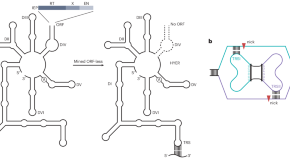
RNA-based programmable DNA cleavage
Natural ribozymes can cleave RNA and single-stranded DNA (ssDNA) by transesterification or a blend of hydrolytic and transesterification reactions. Now, ribozymes have been discovered that catalyze the hydrolytic cleavage of ssDNA. Similar ribozymes could potentially replace large, immunogenic, protein-based nucleases in gene therapies.
- Madeleine B. King
- Audrone Lapinaite
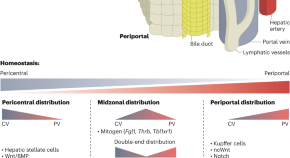
Understanding liver repair through space and time
By integrating spatially resolved single-cell RNA sequencing (scRNA-seq) and Stereo-seq data, two studies in this issue characterize molecular signatures of liver cell types and their interactions in homeostasis, damage, repair and regeneration.
- Lenka Belicova
- Noemi Van Hul
- Emma R. Andersson
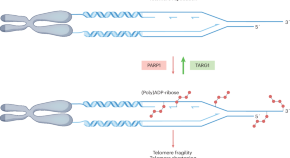
The risky business of ADP-ribosylating telomeric DNA
ADP-ribosylation regulates the activity of numerous proteins involved in the DNA damage response and repair. A new study shows that telomeric DNA can be ADP-ribosylated by PARP1, and prompt removal of the ADP-ribose by TARG1 is essential to preserve telomere integrity, unveiling DNA–ADP-ribosylation as a novel player in telomere stability.
- Ylli Doksani
- Francisca Lottersberger
Related Subjects
- Cell division
- Chromosomes
- CRISPR-Cas systems
- DNA damage and repair
- DNA metabolism
- DNA recombination
- DNA replication
- Epigenetics
- Non-coding RNAs
- Nuclear organization
- Post-translational modifications
- Protein folding
- Proteolysis
- Riboswitches
- RNA metabolism
- Single-molecule biophysics
- Transcription
- Transcriptomics
- Translation
- Transposition
Latest Research and Reviews
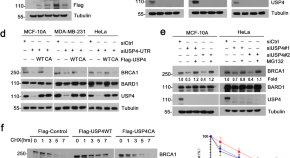
The deubiquitinating enzyme USP4 regulates BRCA1 stability and function
- Xueyuan Guo
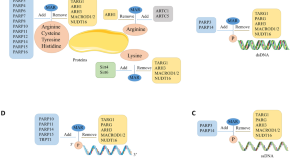
Mono-ADP-ribosylation, a MARylationmultifaced modification of protein, DNA and RNA: characterizations, functions and mechanisms
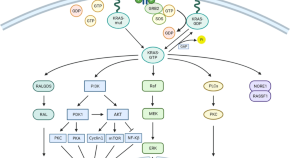

Targeting KRASG12D mutation in non-small cell lung cancer: molecular mechanisms and therapeutic potential
- Yining Tang
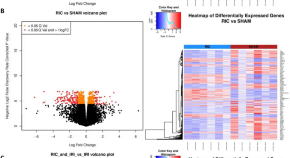
Transcriptomic analysis of the effect of remote ischaemic conditioning in an animal model of necrotising enterocolitis
- Ian Howard Jones
- Jane Elizabeth Collins
- Ashley Ivan Heinson
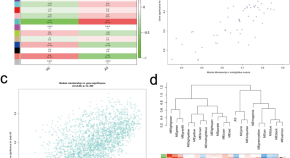
Inflammatory corpuscle AIM2 facilitates macrophage foam cell formation by inhibiting cholesterol efflux protein ABCA1
- Shujiang Zhuo
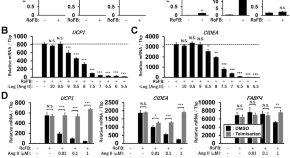
Angiotensin II participates in mitochondrial thermogenic functions via the activation of glycolysis in chemically induced human brown adipocytes
- Yukimasa Takeda
- Toshikazu Yoshikawa
News and Comment

Integrator and U1 snRNPs steer Pol II in the right direction
Cleavage of promoter-upstream antisense RNAs by the Integrator complex supports the preferential transcription of pre-mRNAs.
- Eytan Zlotorynski
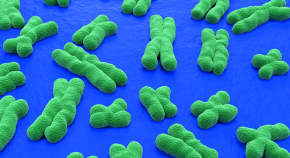
Tandem repeat variation of human centromeres
Logsdon et al. report the second complete sequence of all centromeres from a single human genome, enabling comparative analyses of the variation in tandemly repeating α-satellite DNA.
- Kirsty Minton
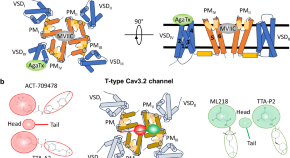
A tale of two calcium channels: structural pharmacology of Cav2.1 and Cav3.2
- Laurent Ferron
- Gerald W. Zamponi
Quick links
- Explore articles by subject
- Guide to authors
- Editorial policies
75 Useful Molecular Biology Research Topics
The area of molecular research in biology is both a well-studied one and a mysterious one. Despite the vast amount of knowledge in this field of science, very little is still known about all its workings. The need to know more about how the world works on a molecular level, has led to this compilation of molecular biology research topics.

Research Topics on Molecular Biology
Below are 75 molecular biology research topics that will prove useful in your quest for knowledge.
- Significance of meiosis
- Differences and similarities between meiosis and mitosis
- The importance of the plasma membrane
- The vehicles of genetics
- Display of dominance in alleles
- The occurrence of co-dominance
- Genetic transmission amongst organisms
- Harmful experiments on the human DNA
- Genetics and increasing life expectancy
- Different forms of cloning techniques
- Spontaneous mutation in humans
- Spontaneous mutation in plants
- Spontaneous mutation in animals
- How GMOs can help feed the world
- Cloning as a major breakthrough in science
- Relationship between genetics and sexual orientation
- Genetic disorders in GMOs
- Evolution of DNA technology and techniques
- Effects of addictions on the genes
- Development of molecular biology over time
- Major milestones in the journey of molecular biology
- Effects of plant hormones on animal cells
- In vitro manufacturing of growth hormones
- The phenomenon of polypeptide folding
- Safe treatment of genetic malfunctions
- DNA sequencing in the expression of Down’s Syndrome
- Using DNA modification to treat mutation
- Diseases from rearrangement of chromosomes
- Diagnosis of diseases using DNA
- Diagnosis of infectious diseases with the DNA
- Diabetes and heredity
- The journey of evolution
- Asexual reproduction
- Human cloning
- The ethics of genetic cloning
- Hypertension and heredity
- Depression and heredity
- Alzheimer’s disease and heredity
- Tay-Sach’s disease and heredity
- Addiction and heredity
- Mutation in fruit crops
- Ethics of genetic editing
- Transmission of synapses to and from the brain
- How does the brain create link in memories?
- How the brain sends information to the rest of the body
- How is the information in the DNA read by the body?
- What are the environmental factors that can lead to mutation?
- Can environmental factors cause a change in a persons genome?
- How molecular biology can help recover DNA of extinct species
- How mutation can help combat illnesses
- Role of genetics in cancer research
- Essential equipment used in molecular biology
- Easy ways of DNA extraction
- Gram positive bacteria versus Gram negative bacteria
- Resilience in bacterial coatings
- Adaptive features of viruses
- Purposes of human cloning
- How GMOs can be viewed as a threat
Cell Biology Research Topics
Below are some cell biology research topics that you can choose to write from, and that will satisfy your curiosity. If you’ve ever wanted to know just how simple and simultaneously complex the cells of living things are, then you will find this list very helpful. These topics were specifically compiled based on the current trends in cellular biology, as well as trends that have left a lasting impression throughout the world of molecular biology.
- Embryonic stem cell creation
- Structural differences between sickle cell and normal cells
- How cells can repair bones
- How do cells move around within the body?
- What can make a cell to be poorly formed?
- Communication between cells
- How does the body dispose dead cells?
- The link between cell structure and resistance development
- Basic techniques applied in cell molecular biology
- What is the origin of living cells?
- How osmosis occurs in living cells
- Effects of antibiotics on bacterial cell membrane
- How viruses mask their presence within cells
- Advantages of embryonic stem cells
- Molecular advancements that can provide insights to cell functioning
- Regeneration of cells in animals
- Cell division
As is seen above, this list offers valuable biology research topics, alongside different cellular biology research topics, so yes; you can find cell biology research topics here too.
Leave a Reply Cancel reply
Your email address will not be published. Required fields are marked *
Department of Biological Sciences
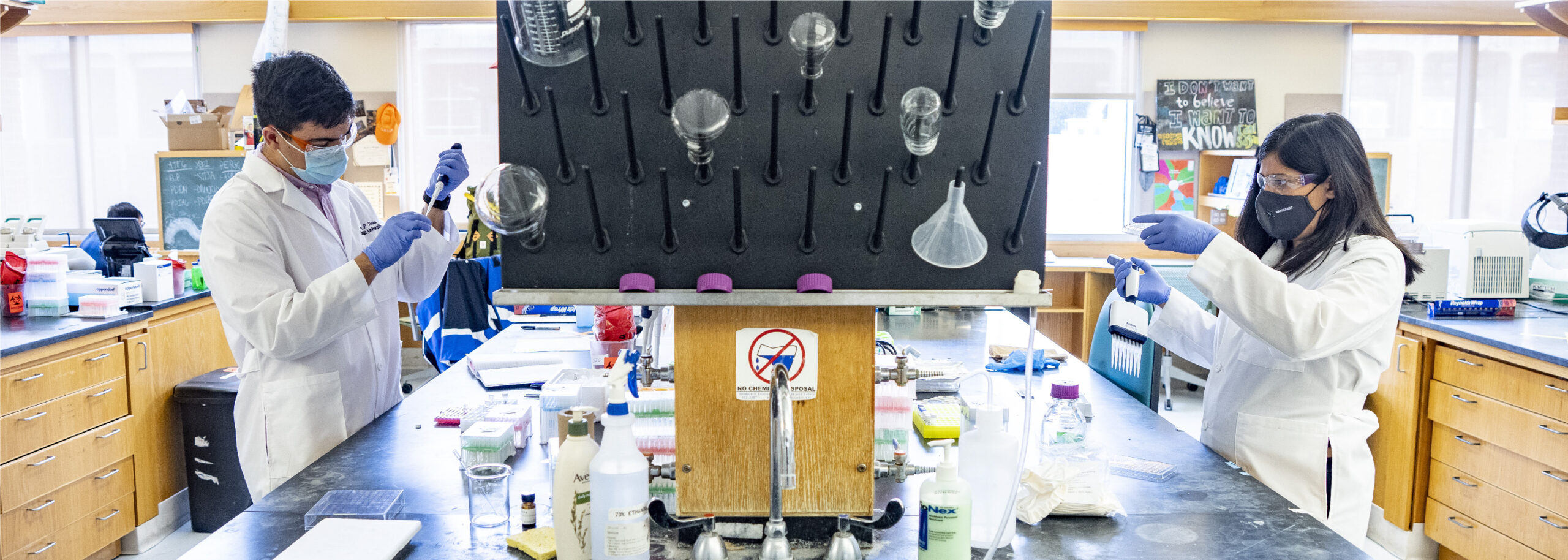
Examples of Undergraduate Research Projects
Fall 2021 projects, previous projects.
Molecular, Cellular and Developmental Biology
2017-2018 undergraduate research projects.
Research Topics
Research at EMBL is fascinating, multifaceted and at the forefront of scientific progress. We encourage highly motivated and dedicated young researchers eager to broaden their experience to join our postdoctoral community.
Postdocs at EMBL have a wide range of backgrounds including, biology, chemistry, biochemistry, molecular biology, medicine, engineering, physics, mathematics, computer science and bioinformatics. Interdisciplinarity is an important strength of research at EMBL and as such we welcome fellows interested in moving into a new area of research.
If you are interested in becoming an EMBL postdoc, the first step is to contact the group leader of your choice directly to ask about opportunities.
See topics by:
- Research themes arrow-button-down
- Methods and Technology Development arrow-button-down
Research themes
Cell biology and biophysics.
- Diz-Muñoz group - Mechanobiology at the cell surface
- Ellenberg group - Systems biology of cell division and nuclear organisation
- Erzberger group - Theory of cellular and multicellular organisation
- Pepperkok team - Membrane traffic and organelle biogenesis
Developmental Biology
- Aulehla group - Timing in embryonic development
- Crocker group - Gene regulation during evolution and development
- Graf group (from Sep.2024) - Theory of biological homeostasis and plasticity
- Ikmi group - Plasticity of animal body design
- Petridou group - Critical points and transitions in tissue morphogenesis
- Rapti group - Assembly mechanisms of nervous system architecture
- van Gestel group - Evolution of microbial development
- Vu Group - Control principles of animal body size
Directors' Research
- Watt Group - Regulation of stem cell fate
Genome Biology
- Furlong group - Genome regulation and chromatin topology during embryonic development
- Noh group - Epigenetic mechanisms of neurodevelopment and diseases
Structural and Computational Biology
- Eustermann group - Exploring the chromatin landscape by cryo-electron microscopy
EMBL Barcelona
- Dayton group - Organoid models of neuroendocrine development and cancer
- Haase group - Engineering vascularised tissue-specific disease models
- Sharpe group - Multicellular systems biology
- Trivedi group - Self-organization in multi-cellular systems
EMBL Grenoble
- Bhogaraju group - Structural biology of ubiquitin signalling
- McCarthy team - Synchrotron crystallography team
- Marcia group - Structure and function of lncRNA-protein complexes regulating development and stress responses
- Márquez team - High-throughput crystallisation laboratory
EMBL Hamburg
- Wilmanns group - Structure and function of molecular machinery for protein translocation across membranes
EMBL-EBI Hinxton
- Petsalaki group - Whole-cell signalling
- Boskovic group - Mechanisms of embryonic gene regulation
- Hackett group - Epigenetic mechanisms and intergenerational inheritance
- Banterle group - Understanding cross-scale principles of cellular organisation
- Cuylen group - Cellular phase separation by surfactants
- Deo group - Building next-generation fluorescent tools for biological imaging
- Dey group - Evolutionary cell biology of the nucleus
- Köhler group - Self-organisation in meiosis
- Kreshuk group - Machine learning for bioimage analysis
- Prevedel group - Advanced optical techniques for deep tissue microscopy
- Quail group - Principles of genome self-organisation
- Schwab team - Volume correlative light and electron microscopy
- Ephrussi group - RNA localisation and localised translation in development
- Vincent group - Symbiosis in marine unicellular eukaryotes
- Saka group - Spatial biology from molecules to tissues: high-dimensional investigation of cellular organisation
- Savitski team - Stability proteomics for assessing the state of the proteome
- Alexandrov Team - Spatial and single-cell metabolomics
- Mahamid group - In-cell structural analysis of phase separation and molecular crowding
- Mattei team - High-throughput cryo-EM
- Torres-Sánchez group - Computational modelling of multicellular systems
- Galej group - Structure and function of RNA-protein complexes
- Arendt group - Evolution of the nervous system in bilateria
- Steinmetz group - Systems genetics and precision health
- Typas group - Systems microbiology
- Bork Group - Deciphering function and evolution of biological systems
- Dodonova group - Organisational principles and 3D architecture of archaeal chromatin
- Dorrity Group - Environmental response at the single-cell level
- Garcia Alai team - Molecular biophysics and high-throughput crystallisation
- Bateman team - Microbial sequence and structure analysis
- Finn group - Computational approaches to understanding microbiomes
- Flicek group - Evolution of transcriptional regulation
- Goldman group - Evolutionary tools for genomic analysis
- Iqbal group - Computational microbial genomics
- Thornton group - Computational biology of proteins (structure, function and evolution) and ageing
- Gross group - Neural control of instinctive behaviour
- Heard group - Epigenetic mechanisms in development and disease
- Hentze group - RNA biology, metabolism and molecular medicine
- Korbel group - From genomic variation to molecular mechanism
- Krebs team - Decoding gene regulation using single-molecule genomics
- Duss group - Assembly mechanisms of protein-RNA complexes at the single-molecule level
- Müller group - Molecular mechanisms of transcriptional regulation in eukaryotes
- Zaugg group - Personalised genomics to study genetic basis of complex diseases
- Kowalinski group - Structural biology of macromolecular protein-RNA complexes
- Brazma team - Functional genomics research
- Zerbino group - Genome analysis research
- Boulard group - Epigenetic gene silencing in mammals
- Zimmermann-Kogadeeva group - Multi-omics-based modelling of microbial ecosystems
- Zeller team - Computational analysis of host-microbiota interactions in disease and drug therapy
- Birney group - Sequence algorithms and intra-species variation
- Cortes Ciriano group - Cancer Genomics
- Zimmermann group - Metabolic microbiome–host interactions
- Bernabeu group - In vitro 3D blood-brain barrier model and cerebral malaria
- Cusack group - Structural biology of RNA-protein complexes in gene expression and host-pathogen interactions
- Kosinski group - Integrative modelling of infection cycles
- Landau Group Group - Functional protein fibrils in microbial infections and aggregation diseases
- Huber group - Quantitative Biology and Statistics
- Djinovic group - Structure and assembly mechanisms of sarcomeric cytoskeleton
- Blanchet team - Characterisation of biological molecules and assemblies using small angle x-ray scattering (SAXS)
- Asari group - Visual systems neuroscience
- Rompani group - Visual circuits in the thalamus
- Kleywegt team - Protein structure, analysis and validation
- Leach group - Molecular recognition and design; drug discovery
Methods and Technology Development
- Schneider group - Tools for structure determination and analysis
Chemistry at EMBL
More information
- Zimmermann team - Advanced Light Microscopy technology development and service provision
- Papp Team - Robotics and process development for MX and Cryo-EM
- Duke Team - Biological X-ray imaging
- Landau Group (Visiting) - Functional protein fibrils in microbial infections and aggregation diseases
- Fiedler team - Synchrotron instrumentation for structural biology beamlines at PETRA III
Training at EMBL
EMBL’s multifaceted training programme is committed to excellence in training at all stages of careers in the life sciences. Alongside training for scientists, EMBL’s education department ELLS shares scientific discoveries with young learners and teachers through inspiring activities.
Harvard University COVID-19 updates

Undergraduate Neuroscience Research and Thesis Neuro Research Guide
Neuro research guide, guide to choosing a neuroscience research lab, part 1: what factors to consider when joining a lab..
There are hundreds of Harvard affiliated labs, and all of them are different. Below, we have distilled those differences into several important categories to consider as you make your choice. The overarching goal is to help you choose a lab that will foster your development as a scientist.
Research Topic. Students often feel that the research topic is the decisive factor. For example, you may have a topic that you are already passionate about ( e.g., Alzheimer’s Disease, Traumatic Brain Injury, or Free Will). While this pre-existing interest can be a great motivator, consider the following: over three semesters and one summer, you will spend > 750 hours in the lab! For that much time, we think the priority should be finding a great lab environment with supportive mentors.
- False! A topic isn’t usually exciting until you learn more about it. We find that once students realize what questions are being asked, what the debates are in this area, and what real-world implications the topic has, what methods are being used/developed, they quickly become passionate about their work.
- False! Medical and graduate schools are evaluating your lab experiences in two major ways: First, they want evidence of your scientific development in the lab, including your independence in designing experiments/analyzing data and your understanding of your research topic. Second, they want to see an authentic, personalized, positive letter from your faculty mentor detailing your drive, independence, attention to detail, collegiality, etc .
Size of the lab. The size of the lab is not always, but very often, a predictor of student success. Higher visibility labs tend to be big (>20 people). Although they are publishing great papers, the environment may not be ideal for undergrads. Why? In bigger labs, it is harder to get face time with the faculty mentor. Moreover, each daily supervisor (post doc or grad student) may have several undergraduates working with them or be consumed with their own work. Students can feel lost when they do not get enough mentoring and attention. Another peril of working for ‘rockstar’ faculty is that projects may be aiming for publication in Nature, Science, or Cell, which can take more than 5 years of full-time teamwork … when things go right. As such, students are often a small part of a bigger, longer project (a ‘cog in the machine’). Their role is often more of a technical one with less control, thought, or creativity in the experimental design and therefore less scientific development and growth.
In spite of the drawbacks, some students prefer to work on high visibility projects in big labs. That is fine but be aware that these projects can lead to lower thesis evaluation grades because faculty evaluators look for evidence that the student has put independent thought and individual work into the thesis.
Independence and Project Type. It is daunting to be responsible for your own research project’s success or failure, especially when you are just starting out in science. Yet, this really is the best way to learn how to do science. Having to make decisions about what experiment to do or how to analyze your work requires a deep understanding of your research area. Large, team projects can be fun, but students often grow and learn more from small projects where they can make decisions.
Typically, projects that are small in scope (short term) work best, so you can learn from your mistakes and get feedback on your results within weeks to reconfigure if need be. Working more independently on a project also gives you more control of your data, rather than being handed data from someone else and not having any influence on how or why the experiments were done.
Mentoring. Arguably the most important aspect of your lab experience is your direct mentor. Try to meet your direct mentor before signing up with a lab. You want to make sure that they are invested in your success: meaning, 1) they has time to meet with your regularly, they have reasonable demands on your time (15 hours or less per week during the term), and they can communicate clearly with you.
Whatever lab you’re in, be sure to schedule face time with the faculty mentor (alone or with your daily supervisor) at least once per month. This will help you forge a connection to the lab head and be part of conversations that can influence your study design and color the interpretation of your results. You should also make an effort to attend lab meeting to learn about other projects and develop your critical thinking/questioning skills.
Commute/ Location. It might seem harrowing, but commuting to a lab is very possible. The free M2 shuttle can get you to the Longwood/hospital area in about 30 minutes (outside of rush hour times and extreme weather). The MBTA can get you to MGH, MIT, Broad Institute just as quickly. As long as you can arrange your schedule to have big blocks of consecutive lab time (3 hours), the commute will only be a fraction of your dedicated lab time.
The good news, if you don’t want to commute, is that labs closer to Cambridge typically have more experience working with undergrads. This often translates into a better mentoring culture for students. All things being equal, we recommend you start looking for a lab on campus (Biolabs, NW Building, William James). If you don’t find a good fit there, consider labs at the Medical School that are affiliated with the Program for Neuroscience . If you still aren’t satisfied, you can extend your search to other Harvard-affiliated hospitals or centers (MGH, Children’s Hospital, Beth Israel, Brigham and Women’s, McLean, etc .)
Part 2: Questions to ask before joining a lab.
Here is a list of potential questions to ask the lab director when you meet to talk about joining a lab:
- Typically, students meet with the faculty mentor two or three times per semester. Its great if it is more frequently, but it should not be less.
- Typically, students work with a grad student or a post-doc. They often meet every time the student comes to lab (at least at the beginning) and communicate informally by email. Since they play a big role in mentoring you, it is always a good idea to meet them before joining.
- Student projects are most rewarding when students are involved in experimental design and all aspects of data analysis. It gives the student more ownership and control of the project, which very often creates a better environment to learn to do science.
- Longer term experiments (more than a year) are usually team-projects where students don’t have much influence or control of the project.
- While every student is different, other undergrads in the lab can usually tell you what kind of experience to expect. (Laura and Ryan can give you feedback on labs students have worked in as well in case you want an additional opinion.)
- Lab meetings can be a great way to assess the group dynamics and lab culture to make sure it feels like a comfortable and stimulating environment for you.
- Typically, students should expect to spend 5-10 hrs/week if they are volunteering in the lab during the semester, or 10-15 hrs/week if they are enrolled in research for credit (Neuro 91). Most labs expect students spend one summer working full-time in the lab (often before senior year) if they are serious about a thesis or a career in research after graduation.
- This varies by lab: sometimes students will choose among several options. Sometimes there might only be one project that needs additional help (or has an available mentor). Occasionally, faculty mentors want students to develop their own project idea! You just don’t know until you ask.
Department of Biology
Undergraduate research.

- Sample BA Schedule
- Upper-level Electives
- Sample BS Schedule
- Information for Prospective Students
- Master’s Program Advanced Course Requirements
- Summer Research Opportunities
One advantage of attending the Johns Hopkins University is the opportunity to participate in research as an undergraduate student. Laboratories in biology, biophysics, chemistry, and engineering, as well as departments at Johns Hopkins Medical Institutions, regularly have openings for qualified undergraduates to participate in research that is sufficiently biological in nature to receive biology credit.
More important than credits, research experience complements classroom education by teaching undergraduates laboratory skills and critical thinking. Ideally, students will move beyond accruing knowledge to actually contributing to knowledge.
Students may earn up to 6 credits per academic year (June through May), with a maximum total of 24 credits applicable to the 120 needed for graduation. Up to 3 credit hours may be earned during each term (fall semester, spring semester, summer, or intersession).
Please note that it is possible to receive both credit and pay for the same work . Most research-for-credit positions are unpaid, but exceptions may exist for students with a fellowship or work study, during the summer or by other arrangements.
Biology research can only receive Satisfactory (S) or Unsatisfactory (U) grades.
Requirements for Undergraduate Research
Professors make a large investment of time and resources in students doing research in their laboratories. If you are thinking about working on a research project, you should first consider several important points:
- Do you have adequate free time available? On average, it will require a minimum of 10 hours per week in the laboratory to earn 3 credits in a semester. It is most desirable that this time be available in a small number of large blocks; for example, three afternoons per week. Working on weekends may eventually be possible, but the initial phase will require you to be in the lab at the same time as those who are training you.
- The second requirement is disciplined study habits. While dedicating at least 10 hours per week to research, you must be able to keep up with your coursework.
- The third requirement is long-term commitment. Professors often expect students to work in their labs for more than one semester in order to make significant headway on a given research project. It usually takes several months of training before students are able to work with significant independence, so students must plan to work for at least a year in a specific lab.
More Information
- Applying for research grants
How to Find a Research Position in a Lab
A student may perform biological research in a laboratory whose supervisor holds a faculty-level appointment at Johns Hopkins University. Researchers at other institutions may also be accepted, depending on your agreement with your research sponsor. Once you determine what sort of biological research interests you, there are several ways to find a suitable research position.
One approach involves consulting the web pages of the relevant departments where lists of the faculty members and their research interests can be found. Another approach is to ask friends or acquaintances if they know of openings in any labs. From these sources, a student can choose several faculty members whose research is of interest to them. The student should then go to the web pages of those faculty members and locate the list of the professor’s current publications. Students can obtain these publications from the library or online and read one or two to gain further insights into the type of research carried out in different labs. Once you have prepared yourself, you should contact the faculty member to express interest and inquire if a position is available. Be brief and ask for an interview. Please do not spam the faculty—write to individuals. See this page of the Research Awards website for more helpful tips on this process.
See more information from the Hopkins Office for Undergraduate Research (HOUR) .
If the faculty member responds favorably, you should write a resume listing your academic qualifications, any previous lab experience, your course schedule (showing the time you have available for research), and bring this to the interview. Treat the interview like a job interview. If the professor has no room, ask if they know of any other labs with openings.
How to Register for Undergraduate Research
After finding a place in a research lab, you must register to receive academic credit.
Contact your research sponsor ahead of time about registering for their section of Independent Research in Biology (AS.020.503) . Once they agree, you may register in SIS. In the Online Forms section, select Independent Academic Work . Fill out the form based on which Biology department faculty member is supervising or sponsoring your research. All research registered through the Biology department is S/U and the number of credits is proportional to the time spent in lab: 40 hours total is equivalent to 1 credit (80 hours = 2 credits, 120 hours = 3 credits). Select your best estimate of credits for the semester. The assigned work is a 3-page summary paper which will be described in more detail by the sponsoring or supervising faculty member. Enter a few sentences to describe your research project and submit the form. The request will be sent to the appropriate faculty member and they can approve the enrollment for credit.
Your sponsoring faculty member may wish to use this summary report file as part of the end-of-term paper.
No more than 6 credits of independent academic work can be earned in one academic year (summer-spring). See the e-catalogue for information on registering for Independent Academic Work.

- USF Research
- USF Libraries
Digital Commons @ USF > College of Arts and Sciences > Molecular Biosciences > Theses and Dissertations
Molecular Biosciences Theses and Dissertations
Theses/dissertations from 2023 2023.
Exploring strain variation and bacteriophage predation in the gut microbiome of Ciona robusta , Celine Grace F. Atkinson
Distinct Nrf2 Signaling Thresholds Mediate Lung Tumor Initiation and Progression , Janine M. DeBlasi
Thermodynamic frustration of TAD2 and PRR contribute to autoinhibition of p53 , Emily Gregory
Utilization of Detonation Nanodiamonds: Nanocarrier for Gene Therapy in Non-Small Cell Lung Cancer , Allan E. Gutierrez
Role of HLA-DRB1 Fucosylation in Anti-Melanoma Immunity , Daniel K. Lester
Targeting BET Proteins Downregulates miR-33a To Promote Synergy with PIM Inhibitors in CMML , Christopher T. Letson
Regulated Intramembrane Proteolysis by M82 Peptidases: The Role of PrsS in the Staphylococcus aureus Stress Response , Baylie M. Schott
Histone Deacetylase 8 is a Novel Therapeutic Target for Mantle Cell Lymphoma and Preserves Natural Killer Cell Cytotoxic Function , January M. Watters
Theses/Dissertations from 2022 2022
Regulation of the Heat Shock Response via Lysine Acetyltransferase CBP-1 and in Neurodegenerative Disease in Caenorhabditis elegans , Lindsey N. Barrett
Determining the Role of Dendritic Cells During Response to Treatment with Paclitaxel/Anti-TIM-3 , Alycia Gardner
Cell-free DNA Methylation Signatures in Cancer Detection and Classification , Jinyong Huang
The Role Of Eicosanoid Metabolism in Mammalian Wound Healing and Inflammation , Kenneth D. Maus
A Holistic Investigation of Acidosis in Breast Cancer , Bryce Ordway
Characterizing the Impact of Postharvest Temperature Stress on Polyphenol Profiles of Red and White-Fruited Strawberry Cultivars , Alyssa N. Smith
Theses/Dissertations from 2021 2021
Multifaceted Approach to Understanding Acinetobacter baumannii Biofilm Formation and Drug Resistance , Jessie L. Allen
Cellular And Molecular Alterations Associated with Ovarian and Renal Cancer Pathophysiology , Ravneet Kaur Chhabra
Ecology and diversity of boletes of the southeastern United States , Arian Farid
CircREV1 Expression in Triple-Negative Breast Cancer , Meagan P. Horton
Microbial Dark Matter: Culturing the Uncultured in Search of Novel Chemotaxonomy , Sarah J. Kennedy
The Multifaceted Role of CCAR-1 in the Alternative Splicing and Germline Regulation in Caenorhabditis elegans , Doreen Ikhuva Lugano
Unraveling the Role of Novel G5 Peptidase Family Proteins in Virulence and Cell Envelope Biogenesis of Staphylococcus aureus , Stephanie M. Marroquin
Cytoplasmic Polyadenylation Element Binding Protein 2 Alternative Splicing Regulates HIF1α During Chronic Hypoxia , Emily M. Mayo
Transcriptomic and Functional Investigation of Bacterial Biofilm Formation , Brooke R. Nemec
A Functional Characterization of the Omega (ω) subunit of RNA Polymerase in Staphylococcus aureus , Shrushti B. Patil
The Role Of Cpeb2 Alternative Splicing In TNBC Metastasis , Shaun C. Stevens
Screening Next-generation Fluorine-19 Probe and Preparation of Yeast-derived G Proteins for GPCR Conformation and Dynamics Study , Wenjie Zhao
Theses/Dissertations from 2020 2020
Understanding the Role of Cereblon in Hematopoiesis Through Structural and Functional Analyses , Afua Adutwumwa Akuffo
To Mid-cell and Beyond: Characterizing the Roles of GpsB and YpsA in Cell Division Regulation in Gram-positive Bacteria , Robert S. Brzozowski
Spatiotemporal Changes of Microbial Community Assemblages and Functions in the Subsurface , Madison C. Davis
New Mechanisms That Regulate DNA Double-Strand Break-Induced Gene Silencing and Genome Integrity , Dante Francis DeAscanis
Regulation of the Heat Shock Response and HSF-1 Nuclear Stress Bodies in C. elegans , Andrew Deonarine
New Mechanisms that Control FACT Histone Chaperone and Transcription-mediated Genome Stability , Angelo Vincenzo de Vivo Diaz
Targeting the ESKAPE Pathogens by Botanical and Microbial Approaches , Emily Dilandro
Succession in native groundwater microbial communities in response to effluent wastewater , Chelsea M. Dinon
Role of ceramide-1 phosphate in regulation of sphingolipid and eicosanoid metabolism in lung epithelial cells , Brittany A. Dudley
Allosteric Control of Proteins: New Methods and Mechanisms , Nalvi Duro
Microbial Community Structures in Three Bahamian Blue Holes , Meghan J. Gordon
A Novel Intramolecular Interaction in P53 , Fan He
The Impact of Myeloid-Mediated Co-Stimulation and Immunosuppression on the Anti-Tumor Efficacy of Adoptive T cell Therapy , Pasquale Patrick Innamarato
Investigating Mechanisms of Immune Suppression Secondary to an Inflammatory Microenvironment , Wendy Michelle Kandell
Posttranslational Modification and Protein Disorder Regulate Protein-Protein Interactions and DNA Binding Specificity of p53 , Robin Levy
Mechanistic and Translational Studies on Skeletal Malignancies , Jeremy McGuire
Novel Long Non-Coding RNA CDLINC Promotes NSCLC Progression , Christina J. Moss
Genome Maintenance Roles of Polycomb Transcriptional Repressors BMI1 and RNF2 , Anthony Richard Sanchez IV
The Ecology and Conservation of an Urban Karst Subterranean Estuary , Robert J. Scharping
Biological and Proteomic Characterization of Cornus officinalis on Human 1.1B4 Pancreatic β Cells: Exploring Use for T1D Interventional Application , Arielle E. Tawfik
Evaluation of Aging and Genetic Mutation Variants on Tauopathy , Amber M. Tetlow
Theses/Dissertations from 2019 2019
Investigating the Proteinaceous Regulome of the Acinetobacter baumannii , Leila G. Casella
Functional Characterization of the Ovarian Tumor Domain Deubiquitinating Enzyme 6B , Jasmin M. D'Andrea
Integrated Molecular Characterization of Lung Adenocarcinoma with Implications for Immunotherapy , Nicholas T. Gimbrone
The Role of Secreted Proteases in Regulating Disease Progression in Staphylococcus aureus , Brittney D. Gimza
Advanced Proteomic and Epigenetic Characterization of Ethanol-Induced Microglial Activation , Jennifer Guergues Guergues
Understanding immunometabolic and suppressive factors that impact cancer development , Rebecca Swearingen Hesterberg
Biochemical and Proteomic Approaches to Determine the Impact Level of Each Step of the Supply Chain on Tomato Fruit Quality , Robert T. Madden
Enhancing Immunotherapeutic Interventions for Treatment of Chronic Lymphocytic Leukemia , Kamira K. Maharaj
Characterization of the Autophagic-Iron Axis in the Pathophysiology of Endometriosis and Epithelial Ovarian Cancers , Stephanie Rockfield
Understanding the Influence of the Cancer Microenvironment on Metabolism and Metastasis , Shonagh Russell
Modeling of Interaction of Ions with Ether- and Ester-linked Phospholipids , Matthew W. Saunders
Novel Insights into the Multifaceted Roles of BLM in the Maintenance of Genome Stability , Vivek M. Shastri
Conserved glycine residues control transient helicity and disorder in the cold regulated protein, Cor15a , Oluwakemi Sowemimo
A Novel Cytokine Response Modulatory Function of MEK Inhibitors Mediates Therapeutic Efficacy , Mengyu Xie
Novel Strategies on Characterizing Biologically Specific Protein-protein Interaction Networks , Bi Zhao
Theses/Dissertations from 2018 2018
Characterization of the Transcriptional Elongation Factor ELL3 in B cells and Its Role in B-cell Lymphoma Proliferation and Survival , Lou-Ella M.m. Alexander
Identification of Regulatory miRNAs Associated with Ethanol-Induced Microglial Activation Using Integrated Proteomic and Transcriptomic Approaches , Brandi Jo Cook
Molecular Phylogenetics of Floridian Boletes , Arian Farid
MYC Distant Enhancers Underlie Ovarian Cancer Susceptibility at the 8q24.21 Locus , Anxhela Gjyshi Gustafson
Quantitative Proteomics to Support Translational Cancer Research , Melissa Hoffman
A Systems Chemical Biology Approach for Dissecting Differential Molecular Mechanisms of Action of Clinical Kinase Inhibitors in Lung Cancer , Natalia Junqueira Sumi
Investigating the Roles of Fucosylation and Calcium Signaling in Melanoma Invasion , Tyler S. Keeley
Synthesis, Oxidation, and Distribution of Polyphenols in Strawberry Fruit During Cold Storage , Katrina E. Kelly
Investigation of Alcohol-Induced Changes in Hepatic Histone Modifications Using Mass Spectrometry Based Proteomics , Crystina Leah Kriss
Off-Target Based Drug Repurposing Using Systems Pharmacology , Brent M. Kuenzi
Investigation of Anemarrhena asphodeloides and its Constituent Timosaponin-AIII as Novel, Naturally Derived Adjunctive Therapeutics for the Treatment of Advanced Pancreatic Cancer , Catherine B. MarElia
The Role of Phosphohistidine Phosphatase 1 in Ethanol-induced Liver Injury , Daniel Richard Martin
Theses/Dissertations from 2017 2017
Changing the Pathobiological Paradigm in Myelodysplastic Syndromes: The NLRP3 Inflammasome Drives the MDS Phenotype , Ashley Basiorka
Modeling of Dynamic Allostery in Proteins Enabled by Machine Learning , Mohsen Botlani-Esfahani
Uncovering Transcriptional Activators and Targets of HSF-1 in Caenorhabditis elegans , Jessica Brunquell
The Role of Sgs1 and Exo1 in the Maintenance of Genome Stability. , Lillian Campos-Doerfler
Mechanisms of IKBKE Activation in Cancer , Sridevi Challa
Discovering Antibacterial and Anti-Resistance Agents Targeting Multi-Drug Resistant ESKAPE Pathogens , Renee Fleeman
Functional Roles of Matrix Metalloproteinases in Bone Metastatic Prostate Cancer , Jeremy S. Frieling
Disorder Levels of c-Myb Transactivation Domain Regulate its Binding Affinity to the KIX Domain of CREB Binding Protein , Anusha Poosapati
Role of Heat Shock Transcription Factor 1 in Ovarian Cancer Epithelial-Mesenchymal Transition and Drug Sensitivity , Chase David Powell
Cell Division Regulation in Staphylococcus aureus , Catherine M. Spanoudis
A Novel Approach to the Discovery of Natural Products From Actinobacteria , Rahmy Tawfik
Non-classical regulators in Staphylococcus aureus , Andy Weiss
Theses/Dissertations from 2016 2016
In Vitro and In Vivo Antioxidant Capacity of Synthetic and Natural Polyphenolic Compounds Identified from Strawberry and Fruit Juices , Marvin Abountiolas
Quantitative Proteomic Investigation of Disease Models of Type 2 Diabetes , Mark Gabriel Athanason
CMG Helicase Assembly and Activation: Regulation by c-Myc through Chromatin Decondensation and Novel Therapeutic Avenues for Cancer Treatment , Victoria Bryant
Computational Modeling of Allosteric Stimulation of Nipah Virus Host Binding Protein , Priyanka Dutta
Cell Cycle Arrest by TGFß1 is Dependent on the Inhibition of CMG Helicase Assembly and Activation , Brook Samuel Nepon-Sixt
Gene Expression Profiling and the Role of HSF1 in Ovarian Cancer in 3D Spheroid Models , Trillitye Paullin
VDR-RIPK1 Interaction and its Implications in Cell Death and Cancer Intervention , Waise Quarni
Regulation of nAChRs and Stemness by Nicotine and E-cigarettes in NSCLC , Courtney Schaal
Targeting Histone Deacetylases in Melanoma and T-cells to Improve Cancer Immunotherapy , Andressa Sodre De Castro Laino
Nonreplicative DNA Helicases Involved in Maintaining Genome Stability , Salahuddin Syed
Theses/Dissertations from 2015 2015
Functional Analysis of the Ovarian Cancer Susceptibility Locus at 9p22.2 Reveals a Transcription Regulatory Network Mediated by BNC2 in Ovarian Cells , Melissa Buckley
Exploring the Pathogenic and Drug Resistance Mechanisms of Staphylococcus aureus , Whittney Burda
Regulation and Targeting of the FANCD2 Activation in DNA Repair , Valentina Celeste Caceres
Mass Spectrometry-Based Investigation of APP-Dependent Mechanisms in Neurodegeneration , Dale Chaput
Advanced Search
- Email Notifications and RSS
- All Collections
- USF Faculty Publications
- Open Access Journals
- Conferences and Events
- Theses and Dissertations
- Textbooks Collection
Useful Links
- Rights Information
- SelectedWorks
- Submit Research
Home | About | Help | My Account | Accessibility Statement | Language and Diversity Statements
Privacy Copyright
- Departments and Units
- Majors and Minors
- LSA Course Guide
- LSA Gateway
Search: {{$root.lsaSearchQuery.q}}, Page {{$root.page}}
- News and Events
- EEB Department
- MCDB Department
- Undergraduates
- Faculty and Staff
- Alumni and Friends

- Majors & Minors
- Honors & Research Thesis Program
- Graduation Information
- Student Resources
- Undergraduate Teaching Assistant (UTA) Position
- Student Groups
- Prospective Students
- Frequently Asked Questions (FAQs)
- Student Events, Job Opportunities, & Newsletter Archive
- Student Research
- Undergraduate Awards & Fellowships
- Study Abroad
- Peer Advisor Application
- Transfer Information
- Preparing for a Course
- Teaching & Grading
- Course Support Staffing
- Services for Students
- Information for GSIs
- Need a Staff Member?
- Giving Opportunities

Independent research is an opportunity to take an active role in studying what you enjoy! Students participate in a lab, field, or modeling project in which they themselves have a say in the design, implementation, and interpretation of experiments. It is expected that the student will meet regularly with his or her mentor as well as gain exposure to the scientific literature of the field. Follow the instructions below to get started. Please email [email protected] with questions!
Independent Study Enrollment Request Process
1. Read the policies below! You are responsible for knowing and abiding by them .
2. Make sure you have the following before requesting enrollment:
- A lab where you’re conducting / supporting biological research (neuroscience students should review the neuro research page ).
- A specific project description that details the work you’ll be doing for credit.
- A faculty Co-Sponsor (if your lab PI is not in the department) – see below for more information.
- A plan for how many credits you’ll be taking. We expect 50 hours of work per term per credit, which amounts to 4-5 hours per week per credit. Some courses must be taken for a set number of credits in order to count towards your major (see policies).
3. Complete the Independent Research Enrollment Request Form below. The form may take 10-15 minutes to complete. If your PI is not an active-research, full teaching faculty member of the department, then on the form you’ll mark their department as “other”. You will then be prompted for your Co-Sponsor’s information. Please do not mark any Lab Techs, Grad Students, PhD Students/Candidates, or Fellows/Post-Docs in place of your PI even if they're who you're technically working under.
4. After you submit the form, we will request written approval from your PI and Co-Sponsor (if you have one). Once we’ve received these approvals we will issue your override to enroll in the course.
Note: Some requests can take a substantial amount of time to process ( 6-8 weeks ). Please submit the form as far in advance as possible to ensure timely enrollment.
Please do not submit duplicate requests. If you have a concern regarding your submission, please email us before submitting again.
Policy Information
Fulfilling Major Requirements with Research: Review the Policies for Students page (linked above) for detailed information on which independent study course(s) can be used to satisfy your major requirements. In most cases, unless stated otherwise you will need to take 3 credits of independent study in a single term to fulfill a specific major requirement (research requirements vary by major). We expect you to complete 50 hours of work per term per credit, which amounts to 12-15 hours per week for 3 credits in the fall or winter terms, and twice that weekly amount during the spring or summer half-terms. If you are at all unsure, please ask! We're happy to help you navigate this process.
What is a Co-Sponsor? Do I need one?
If your lab PI is not an active-research, full-faculty member of the EEB or MCDB department (whichever you’re enrolling under) then you must obtain approval from someone who is. They must agree to serve as your Co-Sponsor before you begin the project.
You Co-Sponsor will review your research project to decide the appropriateness of the work and confirm that it 1) is biological in nature, 2) will help you develop independence, and 3) is not simply a technical training exercise. Your Co-Sponsor will also be the one assigning your grade for the work. The parameters for this grade are up to each individual Co-Sponsor.
Microbiology majors who elect to take MICRBIOL 399 do not need to find a Co-Sponsor, nor does a Neuroscience major who elects to take Psych independent study elections. Neuroscience majors should consult the neuroscience research page.
Research must be conducted on the U-M Ann Arbor Campus or its properties with a UM research-active faculty member.
Finding a Research Project & Mentor
Exploring your interests.
There are hundreds of biology-related research areas at U-M! The first step is to consider what really interests you and start to narrow down your possible research areas. Consider what you liked about certain classes, social issues that interest you, or journal articles or news items that sparked your interest. Explore the broad research areas of U-M Biological Sciences faculty.
Try to think broadly when you are looking for labs – don’t just look at the "cool-sounding" areas. Drill down to the faculty member’s name and specific lab and you will get a more detailed description of his or her research and contact information (email address). You can even go to their lab website for more detail about their research.
Contacting Faculty
Contact faculty by email - one by one. Make sure your spelling and grammar are correct. Use professional language. Do not call them by their first name, call them “Doctor” or “Professor." Ask to meet with them (give them a few times that are good times for you to meet). Be clear in your email message what you are looking for – paid position, volunteer, academic credit - and when you want to start. Let them know if you are considering an Honors thesis project, if you would like to work there multiple semesters, etc.
Do not get discouraged by rejections. Many faculty members have limited space and funding in their lab. You may have to contact at least 20 different labs to find the right fit.
Remember if you wish to receive credit toward your major for research done under the direction of a faculty member in another department or unit of the University, you must obtain approval from a faculty member in EEB or MCDB who agrees to serve as co-sponsor before beginning the project.

EEB RESEARCH spans the full range of biological diversity and includes understanding the diversity of organisms, discerning their history, accounting for their characteristics (evolutionary processes), analyzing the function of their features (functional organismal biology), and understanding how organisms affect and are affected by environmental factors. Take a look at the broad research areas of the faculty in Ecology & Evolutionary Biology and check in to see which EEB faculty are accepting students !

MCDB RESEARCH strives to develop new knowledge through basic research about how living organisms function with a focus on the molecular and cellular levels of all branches of life—bacteria, plants, and animals. Areas of particular research strength are animal physiology and neurobiology, biochemistry, cell biology, developmental biology, microbiology, and plant molecular biology. If you are looking for a molecular or cellular lab, explore the broad areas of research in MCDB and the research themes of MCDB faculty .

THE PROGRAM IN BIOMEDICAL SCIENCES website is another resource for MCDB-related areas. This is a PhD program, but they do a good job of lisiting research areas and faculty ! Note that this resource lists non-MCDB faculty as well, for which you would need an MCDB department faculty co-sponsor (see FAQs below).

UNDERGRAD. RESEARCH OPPORTUNITY PROGRAM (UROP) is open to 1st- and 2nd-year students only, but it's a great way to get connected with research and faculty in a variety of fields. Review their website for additional information and application.
Field Research Facilities

Our modern teaching and research laboratories house electron microscopes, controlled environment rooms, analytical and preparative centrifuges, spectrophotometers, and other tools essential for modern research in all areas of the biological sciences.
But in addition to classrooms and labs, students have access to a variety of other facilities: The Herbarium, the Museum of Paleontology , the Museum of Anthropology's Archaeobiology Laboratories , the Museum of Zoology , and the Matthaei Botanical Gardens supplement the instructional and research programs. University-owned research facilities in the vicinity of Ann Arbor include Saginaw Forest , Edwin S. George Reserve , Stinchfield Woods , and Mud Lake Bog !
Additionally, the Biological Station provides off-site facilities for instruction and research in Northern Michigan!

- Information For
- Current Students
- More about LSA
- How Do I Apply?
- LSA Magazine
- Academic Advising
- Global Studies
- LSA Opportunity Hub
- Social Media
- Update Contact Info
- Privacy Statement
- Report Feedback
The request to the URL needs to be verified.
The request to the URL is paused, and must be verified for you to access it. This question is for testing whether you are a human visitor, and to prevent automated spam submission.
What code is in the image submit
Incident ID: 14604593417983450024
For comments and questions: [email protected]
Molecular and Cell Biology
Spring 2024 MCB Transcript


College of Biological Sciences
One cbs student’s mission to inspire and uplift the next generation of scientists.
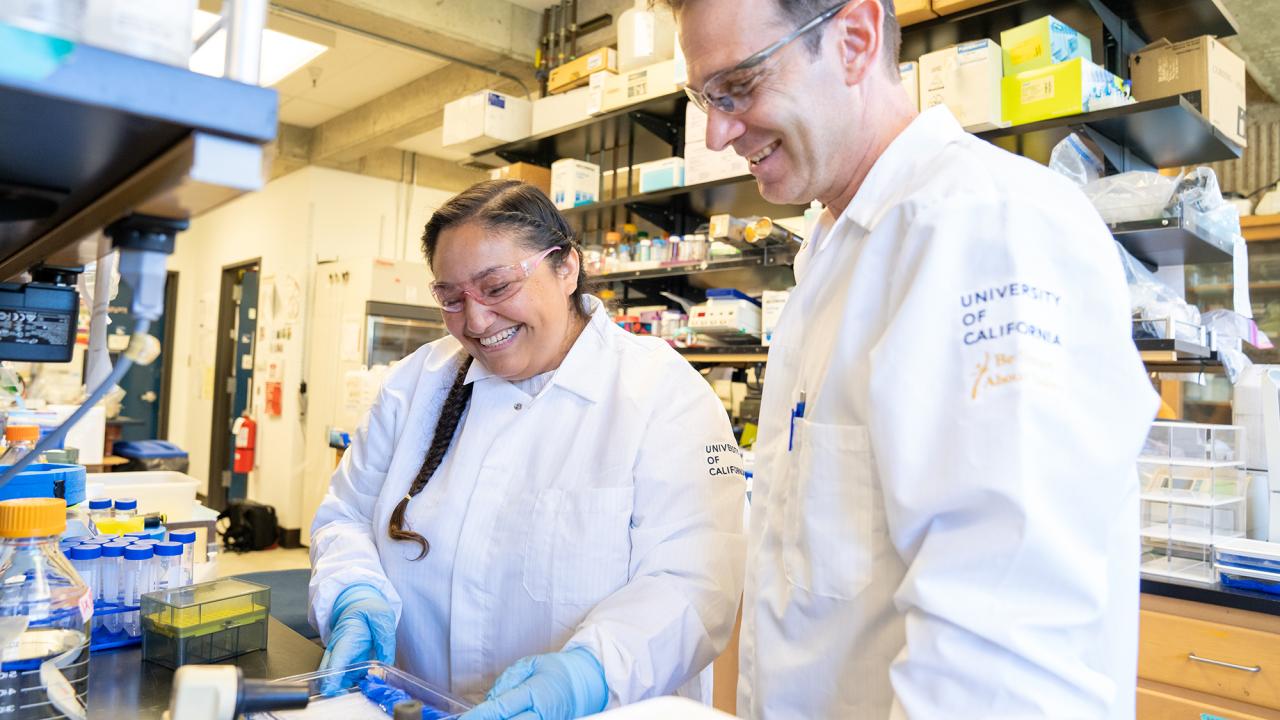
- by Liana Wait
- May 09, 2024
Jessica Bolivar, a graduate student in the Biochemistry, Molecular, Cellular and Developmental Biology (BMCDB) Graduate Group, knows firsthand the difference that one person’s mentorship can make.
During her time at UC Davis, Bolivar has made it her mission to give back and inspire the next generation of scientists by balancing her research with a slew of community-uplifting and diversity, equity and inclusion initiatives.
“One person changed my whole career path,” Bolivar said. “That’s where my passion comes from with these initiatives—I just want to inspire the next generation of students.”
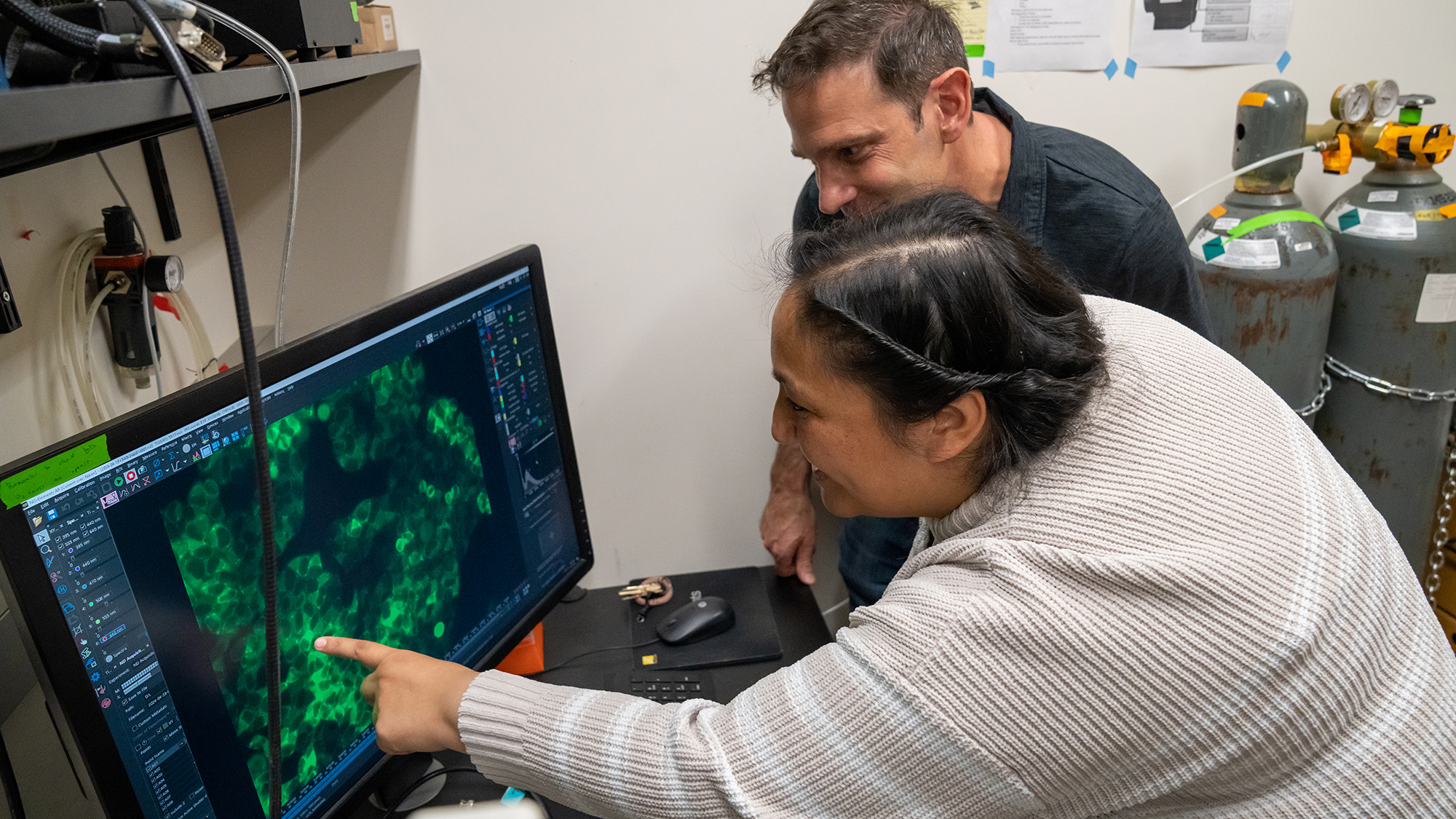
Her parents’ legacy
Bolivar grew up in San Pablo, California in a large but close-knit family that taught her to prioritize community and education. She and her siblings were the first in their family to graduate college, and Bolivar says she was inspired to strive academically by her parents, particularly her father.
“My dad unfortunately wasn’t able to witness us graduate because he passed away, but he’s the reason I’m here—I do everything because my parents made sacrifices in order for me to go to school,” said Bolivar.
A winding path to research
“I got into science by accident,” Bolivar said.

Bolivar always wanted to help people. As an undergraduate at San Francisco State University (SFSU), she aspired to become a medical doctor, but when her father got sick, she wasn’t able to maintain her grades. After graduating, she worked for several years in the Housing Department at her alma mater while taking courses to boost her GPA—all while l dreaming of med school. Then, a chance conversation convinced her to give research a try.
“It was my former cell biology professor who got me back into school,” Bolivar said. “He told me, you can help people in other ways—you can help people in research.”
Bolivar went on to complete a master’s degree in cell and molecular biology at SFSU before moving to Davis, where she is currently pursuing her Ph.D. “I just fell in love with research,” she said. “’It’s a journey where you’re exploring new territory.”
Cell imaging—a window into the cell’s stress response
In the BMCDB graduate group, Bolivar is investigating the molecular mechanisms that cells use to deal with stress in the lab of Christopher Fraser , a professor in the Department of Molecular and Cellular Biology. In the predominately biochemistry-based lab, Bolivar is taking a different angle to examine cell stress—by drawing on her passion and experience with cell imaging.
“I love cell biology, I love imaging,” Bolivar said. “I just feel at peace when I can see something. It’s so fascinating to watch a process and then disrupt it and see what happens.”
Fraser, Bolivar’s advisor, says that her dedication to science and fostering an inclusive workplace culture have left a deep impression.
“Within the laboratory, her creation of an innovative assay for real-time monitoring of the cellular stress response has revolutionized our comprehension of this intricate process,” Fraser said. “Beyond the laboratory, Jessica's altruistic efforts to champion underrepresented scientists at UC Davis serve as a beacon of inspiration.”
Giving back—DEIJ work at Davis
With the support and mentorship of Ben Montpetit , the Chair of the Biochemistry, Molecular, Cell and Developmental Biology graduate group, Bolivar has used her time at Davis to give back in various ways.
“Jessica is a wonderful person who simply cares about everyone,” Montpetit said. “She has committed countless hours to building community here at UC Davis. Her efforts have created changes within BMCDB that impact how we operate, which will continue long after Jessica graduates and moves on from UC Davis.”
As the co-chair of outreach for the UC Davis Diversity, Equity, Inclusion Committee from 2020 to 2022, Bolivar traveled to California State Universities where she coordinated and spoke at colloquiums and workshops for undergraduate and master’s students.

Along with graduate students, Jasmine Esparza and Cuauhtemoc Gonzalez, Bolivar co-founded theirSTORY in 2023, a seminar series that celebrates underrepresented scientists. The inspirational talks focus on the narratives and journeys of UC Davis faculty and staff with diverse identities and backgrounds.
“It’s important to hear from people who have already succeeded in these positions, and to learn about their journeys and identities,” said Bolivar. “I’m first generation, so I didn’t have mentors or family members that have already been in these positions.”
Bolivar also co-founded the California Emerging Scientist Workshop, a 5-day workshop that UC Davis premiered in August 2023 in partnership with the Advanced Imaging Center at HHMI Janelia.
The workshop, which brought together 24 undergraduate and master’s students from diverse backgrounds and introduced them to the fundamentals of microscopy and analysis, was inspired by Bolivar’s own experience at a two-week microscopy workshop that she had attended at Janelia. “I just thought, wow, I wish I had this information when I was a younger career scientist,” Bolivar said.
Participants described the experience as a “gamechanger” that made them more comfortable as scientists, Bolivar said. “It was a lot of positivity.”
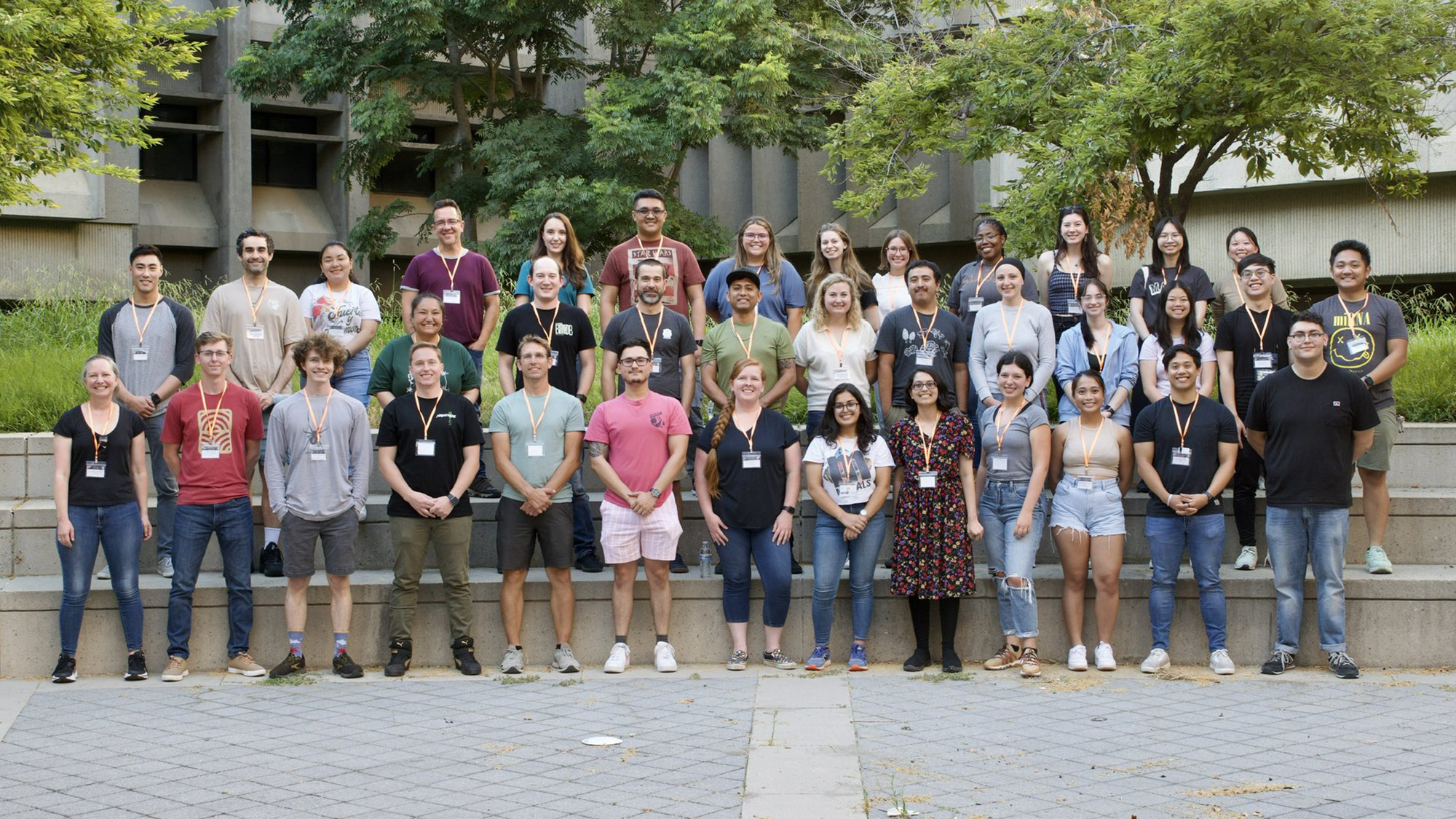
Aspiring to inspire
Bolivar, who is set to graduate this spring, is still exploring her immediate next steps but plans to continue promoting diversity and equity in science. Ultimately, she dreams of setting up a science camp for kids with disabilities.
“I have a disability, and I think it’s really important that we promote equity,” said Bolivar. “Anywhere I can impact and inspire the next generation, that’s where I want to be.”
Media Resources
- Liana Wait is a freelance science writer based in Philadelphia. She has a Ph.D. in ecology and evolutionary biology and specializes in writing about the life sciences.
Primary Category
Secondary categories.
Consider an undergraduate summer research internship in government

What should you do with your summers during college? It’s a question worth thinking about.
There’s something to be said for a lazy break spent savoring the long days and slow pace of the season. Or you could work a summer job, take a class, travel or stay on campus for a summer program at your college.

Another option for the life science–minded is a research internship.
If you’re at a college that that doesn’t have many lab opportunities on campus, a research internship could be a useful way to get a taste of lab work. One common way to get such experience is through a Research Experiences for Undergraduate, or REU, program at a research university.
This week though, I’m focusing on undergraduate internships at government agencies that do life science–related work. This can give a different perspective on research than purely academic labs.
Like so much in government, the information for these internships can be hard to find, unclear and full of outdated links, or links that send you on an endless loop among the same three pages.
So here’s a roundup of places to look for government internships, with descriptions that are up to date and links that (hopefully) still work.
The websites list many of these internships seasonally. If you check one of the pages and no opportunities are there, it may be after the deadline and applications have not yet opened up for the following year. Check back later, and you may see more options listed.
Oak Ridge Institute for Science and Education
ORISE might be the best place to start looking. While it’s headquartered in Oak Ridge, Tennessee, it is not directly associated with Oak Ridge National Labs or restricted to programs in Tennessee.
ORISE is a part of the Department of Energy, though it oversees programs for career development and training at virtually all science-related government institutions and all career stages. The ORISE fellowships site is a real treasure trove of fellowships and internships — if you can sort through it. In addition to those for undergrads, you might notice it has tons of fellowships for grad students, postdocs and beyond, so remember it for later in your career.
Check out the pages for ORISE-run programs at the Centers for Disease C ontrol and Prevention , the Food and Drug A dministration , the U.S. Department of A griculture and the Department of D efense , among many other institutes and centers. Many of the internships posted on individual agency sites in the roundup below are administered through ORISE, and you’ll also find them on the ORISE site.
National Institutes of Health
The NIH has a full-time summer internship program for people enrolled in or about to start undergraduate, graduate or professional school. The program has a central application process, but applicants are selected by the PIs who will host the interns in their labs; this means you must reach out to individual PIs and find someone who will host you.
It’s worth looking into all the different NIH campuses and what they focus on as you decide who you want to work with.
Food and Drug Administration
The FDA has many programs , though not all those listed run every year or are open to undergraduates.
The National Center for Toxicological Research in Arkansas runs a 10-week summer research internship where FDA scientists mentor the interns. If your college is close to the FDA campus in Arkansas, you might also want to look into internships for undergraduates to work part-time during the year and full-time in the summer.
Bonus: The FDA’s oncology center of excellence hosts high school students for a summer scholars program in Maryland.
Centers for Disease Control
The CDC offers a range of internships, some run directly at the CDC in Atlanta and some with partners around the country.
The CDC and the FDA both participate in the Pathways program, which is designed to get people started in government career paths.
Department of Defense
The DoD has a range of summer internships for undergraduates that can be found here .
Enjoy reading ASBMB Today?
Become a member to receive the print edition monthly and the digital edition weekly.
Elizabeth Stivison is a postdoctoral researcher at Vanderbilt University studying inositol signaling and a careers columnist for ASBMB Today.
Related articles
Featured jobs.
from the ASBMB career center
Get the latest from ASBMB Today
Enter your email address, and we’ll send you a weekly email with recent articles, interviews and more.
Latest in Careers
Careers highlights or most popular articles.
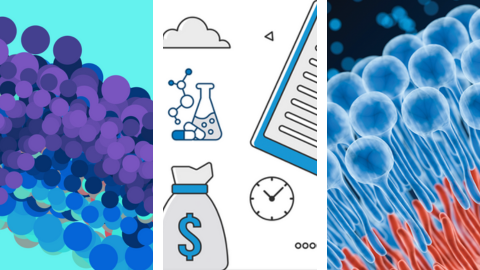
Upcoming opportunities
Molecule of the year nominations are due Friday! Plus: A new Finding the Funds webinar and LRD seminar are coming up later this month.

Putting ASBMB conferences on your radar! Plus: Award nominations are due Friday.

Retiring a research lab
Careers columnist Courtney Chandler talks to Art Spector, a former principal investigator, about making a graceful exit from the bench.

Calendar of events, awards and opportunities
Nominate colleagues for the ASBMB annual awards and your favorite molecule for our inaugural contest!

Industry partnership opportunities
The deadline for these is May 31.

Let’s make ASBMB awardees look more like BMB scientists
Think about nominating someone outside your immediate network.
- Inside SMCM
- Tips & Tricks

- Academic Calendar
- Contact Directory
- H.C.L. Library
- Student Portal
Kingsland '25 Receives ASBMB Grant

Tamani Kingsland '25, a biochemistry and biology double-major from Upper Marlboro, Maryland has received a $1,200 Undergraduate Research Grant from the American Society for Biochemistry and Molecular Biology (ASBMB). Kingsland's grant will support her 2024 St. Mary's Undergraduate Research Fellowship (SURF) project this summer under the guidance of faculty mentor Professor Pamela Mertz.
"The in-vitro research that I will be conducting is one that requires the proper maintenance and treatment of tissue culture. Agents that are integral to cellular respiration including but not limited to tissue-grade medium and CO2 are rather expensive in high quantities," said Kingsland. "The ASBMB Undergraduate Research Grant provides me the opportunity to account for such material for the St. Mary's Undergraduate Research Fellowship in addition to my SMP. I am grateful to have been recognized by ASBMB and plan to continue seeking out funding opportunities for this ambitious research project."
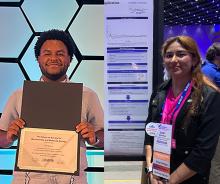
New sex-determining mechanism in African butterfly discovered
In a study of a species of African butterfly, researchers have discovered a previously undescribed molecular mechanism of how the sex of an embryo is initially specified.
Across species, a molecular switch is required to initiate development of a newly formed embryo into a female or a male. The genetic identity of this molecular switch, and how it actually works, differs widely across animal groups, which implies that over evolutionary time the sex determination mechanism is under pressure to change.
In insects, the identity of these primary signals, and how they function, has been described in only a handful of species.
In butterflies and moths, it is the females that determine the sex of offspring. The most common sex determination switch is thought to be a gene ( Feminizer ) on the female-specific W chromosome, which initiates the female pathway by inhibiting a gene ( Masculinizer ) on the sex (Z) chromosome that initiates the male pathway.
Working on a species of African butterfly, the Squinting Bush Brown, researchers from the University of Liverpool have discovered a radically different molecular switch that does not require a sex-limited gene or chromosome. Instead, it relies on recognition of sequence differences between the two copies of Masculinizer within genetic (ZZ) males, to produce healthy males.
When an embryo has one Z chromosome, and therefore one copy of Masculinizer , it develops into a healthy female (even in the absence of the W chromosome). However, a cost of this mechanism is that ZZ (genetically male) embryos with identical copies of Masculinizer are sent down the female developmental pathway and die as embryos because of imbalances between the expression of genes on the Z chromosome and autosomes (non-sex chromosomes).
Butterflies who mate with an individual that shares an identical copy of Masculinizer produce 50% fewer sons than non-identical pairings. This makes it highly advantageous to be a rare variant (allele) of Masculinizer , resulting in very large numbers of alleles in these butterflies.
Corresponding author the University of Liverpool's Ilik Saccheri, Professor of Ecological Genetics said: "Nature has devised many ways of producing males and females. Our discovery of this primary switch highlights the fascinating diversity of sex-determining mechanisms and underlying evolutionary drivers. We suspect that this alternative mechanism evolved as a response to male-killing bacteria that are known to subvert sex-determination machinery in order to promote their own transmission through host females. In the future, we would like to reconstruct where on the evolutionary tree this alternative sex determination mechanism evolved, explore whether structurally similar mechanisms have evolved independently in other butterflies and moths, and figure out how the Masculinizer same/different mechanism actually functions."
- Mating and Breeding
- New Species
- Insects (including Butterflies)
- Evolutionary Biology
- Biotechnology and Bioengineering
- Molecular Biology
- Molecular biology
- Sex linkage
- Monarch butterfly
- African Wild Dog
- Difference between a butterfly and a moth
- Jane Goodall
- Genetic recombination
Story Source:
Materials provided by University of Liverpool . Note: Content may be edited for style and length.
Journal Reference :
- Arjen E. van’t Hof, Sam Whiteford, Carl J. Yung, Atsuo Yoshido, Magda Zrzavá, Maaike A. de Jong, Kian-Long Tan, Dantong Zhu, Antónia Monteiro, Paul M. Brakefield, František Marec, Ilik J. Saccheri. Zygosity-based sex determination in a butterfly drives hypervariability of Masculinizer . Science Advances , 2024; 10 (18) DOI: 10.1126/sciadv.adj6979
Cite This Page :
Explore More
- Controlling Shape-Shifting Soft Robots
- Brain Flexibility for a Complex World
- ONe Nova to Rule Them All
- AI Systems Are Skilled at Manipulating Humans
- Planet Glows With Molten Lava
- A Fragment of Human Brain, Mapped
- Symbiosis Solves Long-Standing Marine Mystery
- Surprising Common Ideas in Environmental ...
- 2D All-Organic Perovskites: 2D Electronics
- Generative AI That Imitates Human Motion
Trending Topics
Strange & offbeat.

IMAGES
VIDEO
COMMENTS
Now-a-days a lot of research is going on in molecular biology and people are in search of novel areas in molecular biology for conducting research with a sole purpose of finding some new techniques or new things that can be used for human or animal welfare. Students of graduation, post-graduation and PhD levels are working on several topics for ...
Research Topics in Biology for Undergraduates. 41. Investigating the effects of pollutants on local plant species. Microbial diversity and ecosystem functioning in a specific habitat. Understanding the genetics of antibiotic resistance in bacteria. Impact of urbanization on bird populations and biodiversity. Investigating the role of pheromones ...
Molecular Biology Research Topics For Undergraduates. 31. Studying the structure and function of DNA and RNA molecules. 32. Analyzing the regulation of gene expression in eukaryotic cells. 33. Investigating the mechanisms of DNA replication and repair. 34. Studying the role of non-coding RNAs in gene regulation.
Molecular Biology is the field of biology that studies the composition, structure and interactions of cellular molecules such as nucleic acids and proteins that carry out the biological processes ...
Micronutrient Biology; Molecular Biophysics; Molecular Diagnostics and Therapeutics; Molecular Evolution; Molecular Recognition; Nanobiotechnology; Protein Biochemistry for Basic and Applied Sciences; ... 860 Research Topics Guest edit your own article collection Suggest a topic. Submission. null.
Below are 75 molecular biology research topics that will prove useful in your quest for knowledge. Significance of meiosis. Differences and similarities between meiosis and mitosis. The importance of the plasma membrane. The vehicles of genetics. Display of dominance in alleles. The occurrence of co-dominance.
As Molecular Biology majors, students have the opportunity to conduct original research in the laboratories of world-class scientists. A broad range of research areas is represented among the Molecular Biology faculty; in addition, majors can pursue interdisciplinary interests by working with approved faculty in departments including Chemical and Biological Engineering, Chemistry, Computer ...
By Research Area. Molecular and Cellular Biology; Ecology, Evolution, and Organismal Biology; Neuroscience; Teaching Faculty; Research Faculty; Secondary and Adjunct; ... Examples of Undergraduate Research Projects Fall 2021 Projects. Student Research Proposal; Whitney Brown: Characterizing the role of FOXP3 in ccRCC:
The undergraduate program in Molecular Biology is designed to provide students with the knowledge and skills they need to explore the central questions of 21st century biology. Our distinguished faculty are fully engaged in teaching and cutting-edge research on topics ranging from molecules to genomes. A cohesive core curriculum and a diversity ...
Carling, Tobias. (Endocrinology) Molecular Genetics of Adrenocortical Tumorigenesis. Chang, William. (Nephrology) Investigation of Interactions Between Human Endothelial Cells and Renal Glomeruli. Colon-Ramos, Daniel. (Cell Biology) Transforming Sensation into Behavior: Examining the Regulation of C. elegans Temperature Preference and ...
Research Areas. Biochemistry, Biophysics & Structural Biology. Biochemistry and Biophysics are the foundation of all cellular processes and systems. Biochemical processes account for the functions of cellular building blocks, from nucleic acids and proteins to lipids and metabolites, and the formation of complex networks that make a cell or ...
Undergraduate Overview. The Faculty of the Department of Molecular and Cellular Biology share a commitment to undergraduate education. This commitment is shown by the diverse offering of undergraduate concentrations and courses as well as the opportunity for hands-on research in MCB Faculty labs. In addition to these formal experiences, the MCB ...
Research Topics. Research at EMBL is fascinating, multifaceted and at the forefront of scientific progress. We encourage highly motivated and dedicated young researchers eager to broaden their experience to join our postdoctoral community. Postdocs at EMBL have a wide range of backgrounds including, biology, chemistry, biochemistry, molecular ...
Consent of the instructor is required, however. In this course, students will gain experience in an active biochemistry and molecular biology research lab, learning and performing experiments or researching a topic relevant to the current projects in that lab. URES:3994 - Undergraduate Research/Creative Projects
Research Topic. Students often feel that the research topic is the decisive factor. For example, you may have a topic that you are already passionate about (e.g., Alzheimer's Disease, Traumatic Brain Injury, or Free Will). While this pre-existing interest can be a great motivator, consider the following: over three semesters and one summer ...
A List of Researchable Topics for Biology. A list of researchable topics for biology students starts with several interesting biological topics concerning sociological perspective and ethical issues. The most debatable subjects are abortion, human cloning, genetic researches and the new ethics that should be created to resolve these issues.
The National Science Foundation estimates that 80% of the jobs available during the next decade will require math and science skills, dictating that programs in biochemistry and molecular biology must be transformative and use new pedagogical approaches and experiential learning for careers in industry, research, education, engineering, health-care professions, and other interdisciplinary fields.
All research registered through the Biology department is S/U and the number of credits is proportional to the time spent in lab: 40 hours total is equivalent to 1 credit (80 hours = 2 credits, 120 hours = 3 credits). Select your best estimate of credits for the semester. The assigned work is a 3-page summary paper which will be described in ...
PCR, Cloning, Restriction Digestion, Ligation, Transformation, Plasmid et al | Explore the latest full-text research PDFs, articles, conference papers, preprints and more on MOLECULAR BIOLOGY.
Quantitative Proteomics to Support Translational Cancer Research, Melissa Hoffman. PDF. A Systems Chemical Biology Approach for Dissecting Differential Molecular Mechanisms of Action of Clinical Kinase Inhibitors in Lung Cancer, Natalia Junqueira Sumi. PDF. Investigating the Roles of Fucosylation and Calcium Signaling in Melanoma Invasion ...
The Molecular Biology major is one of the larger concentrations at Princeton, with 50 to 60 sophomores joining the department each spring. Our introductory Cell and Molecular Biology course, together with courses in chemistry, physics, and statistics, prepare students for three upper level core courses covering fundamentals of modern experimental biology - genetics, biochemistry, and cell ...
Fulfilling Major Requirements with Research: Review the Policies for Students page (linked above) for detailed information on which independent study course(s) can be used to satisfy your major requirements. In most cases, unless stated otherwise you will need to take 3 credits of independent study in a single term to fulfill a specific major requirement (research requirements vary by major).
It needs to be in the area of molecular biology. ... Mr/Dr Chidi, has a good point though, if this is a masters or phd topic or required undergraduate research thesis, you would need the advisance ...
UNDERGRADUATE STUDENTS. MCB Class of 2023 Sponsored Research Award Recipients: Viktoriya Georgieva (Savage Lab), Meralda Jeong (Refermat Lab, IGI), ... Dept. of Molecular & Cell Biology 142 Weill Hall #3200 Berkeley, CA 94720-3200. Phone: (510) 643-3406. Email: [email protected].
Welcome to the Department of Cell and Molecular Biology (ICM), one of the most international, broad and distinguished biomolecular departments in Europe. European master and doctoral students recently ranked Uppsala University first in biology and second in chemistry. Research interests, ranging all the way from cell biology down to biophysics ...
Molecular and Cell Biology Department. 142 Weill Hall #3200. Berkeley, CA 94720-3200. Send Address Changes to: University Development and Alumni Relations. 2080 Addison St #4200. Berkeley, CA 94720-4200. Or e-mail: [email protected].
Jessica Bolivar, a graduate student in the Biochemistry, Molecular, Cellular and Developmental Biology (BMCDB) Graduate Group, knows firsthand the difference that one person's mentorship can make. During her time at UC Davis, Bolivar has made it her mission to give back and inspire the next generation of scientists by balancing her research with a slew of community-uplifting and diversity ...
The FDA has many programs, though not all those listed run every year or are open to undergraduates. The National Center for Toxicological Research in Arkansas runs a 10-week summer research internship where FDA scientists mentor the interns. If your college is close to the FDA campus in Arkansas, you might also want to look into internships ...
Tamani Kingsland '25, a biochemistry and biology double-major from Upper Marlboro, Maryland has received a $1,200 Undergraduate Research Grant from the American Society for Biochemistry and Molecular Biology (ASBMB). Kingsland's grant will support her 2024 St. Mary's Undergraduate Research Fellowship (SURF) project this summer under the guidance of faculty mentor Professor Pamela Mertz.
In a study of a species of African butterfly, researchers have discovered a previously undescribed molecular mechanism of how the sex of an embryo is initially specified. Across species, a ...